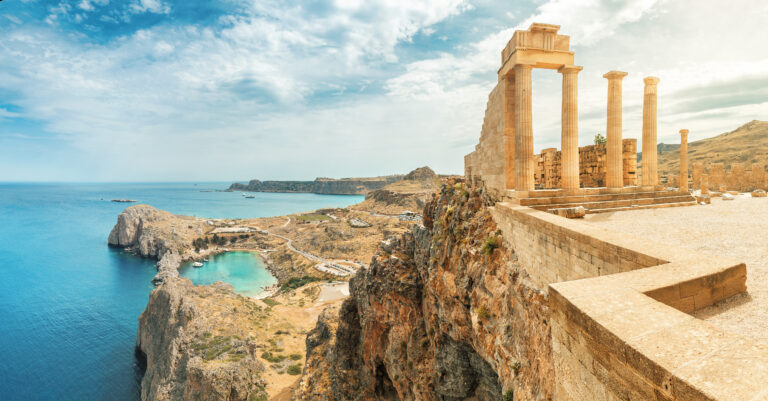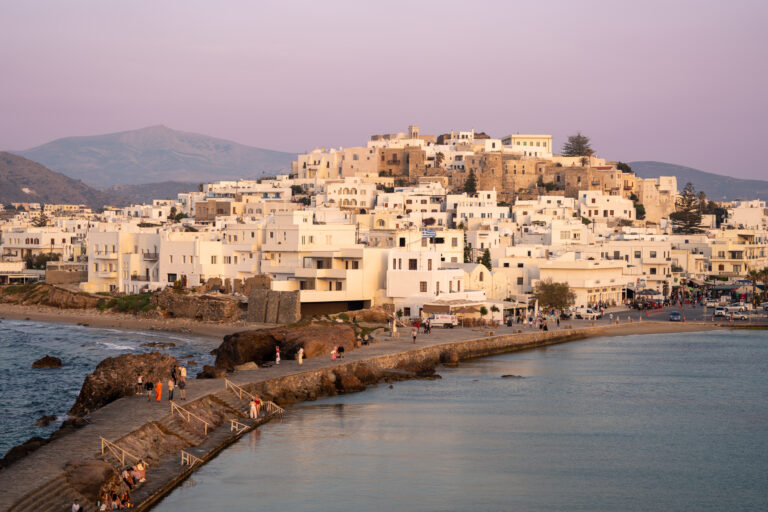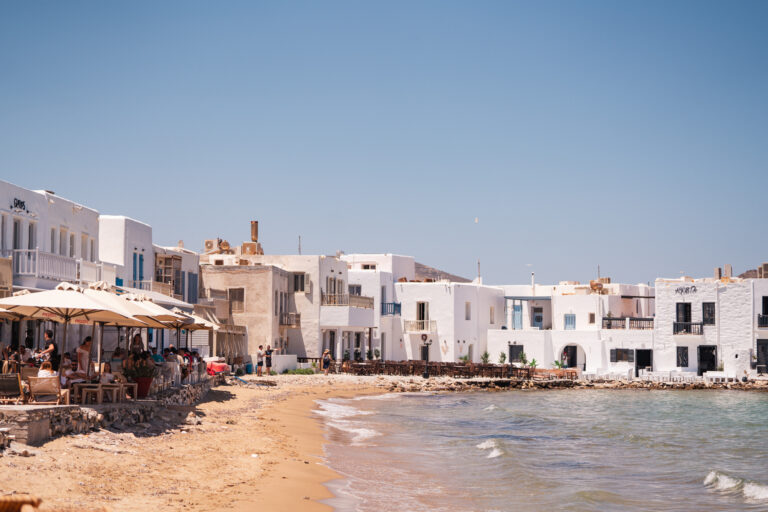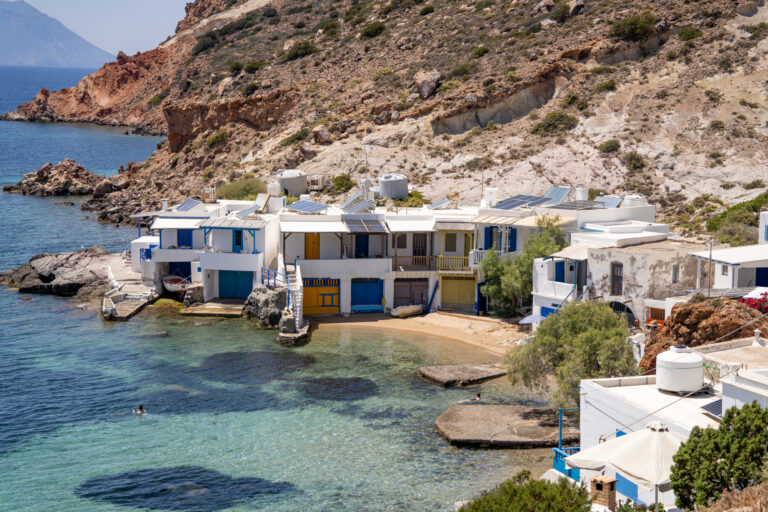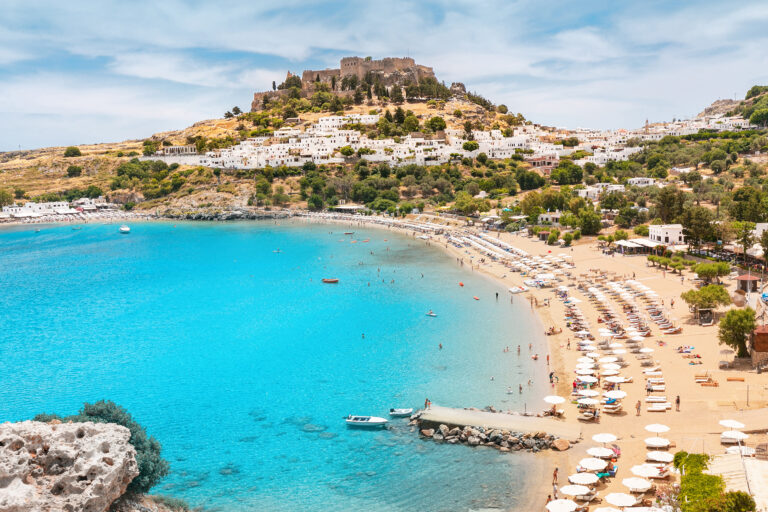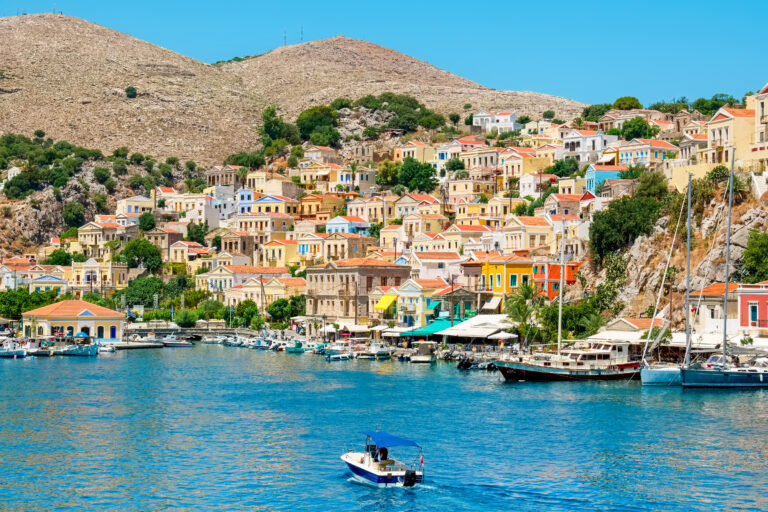Best Things to do in Milos, Greece
Milos is the westernmost island of the Cyclades archipelago. It’s known as the ‘Island of Colours’ – courtesy of rugged volcanic cliffs tinted in shades of orange, red and pink appearing to change at different times of the day.
This is a Greek island awash with ancient theatres, charming towns, subterranean catacombs and authentic tavernas serving homemade fresh food. This is also a wonderful destination for adventurers who wish to sail, hike, snorkel or tour Milos by car or ATV.
If you’re seeking wild nightlife and party resorts, Milos may not be for you, but if spending time in nature, learning about local culture, sampling mouthwatering cuisine, and lounging on one of the island’s 70 beautiful sandy beaches tops your list of things to do, Milos may just be your perfect match.
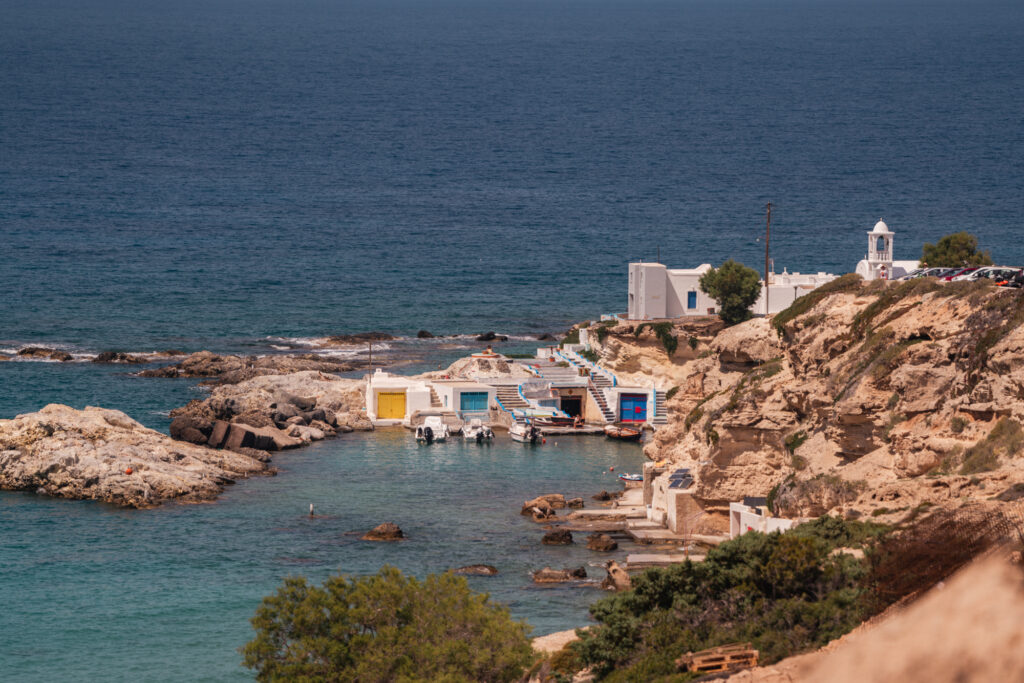
Why is Milos Worth Visiting?
Previously Milos was often overlooked by travellers – shunned in favour of more tourist-driven Cycladic Greek islands such as Mykonos and Santorini.
But Milos has seen increased popularity in recent years (largely thanks to social media), and it won’t be long before it’s just as busy as its more famous counterparts. So now’s the time to go!
This is a place where the iconic Venus de Milo statue was discovered by a local farmer. A place where fishing villages with colourful buildings beckon and dozens of golden beaches lapped by turquoise waters await.
There are stories of pirates and legends, museums and ancient sites to explore and friendly locals to meet and converse with over a glass of ouzo and plates of mezze.
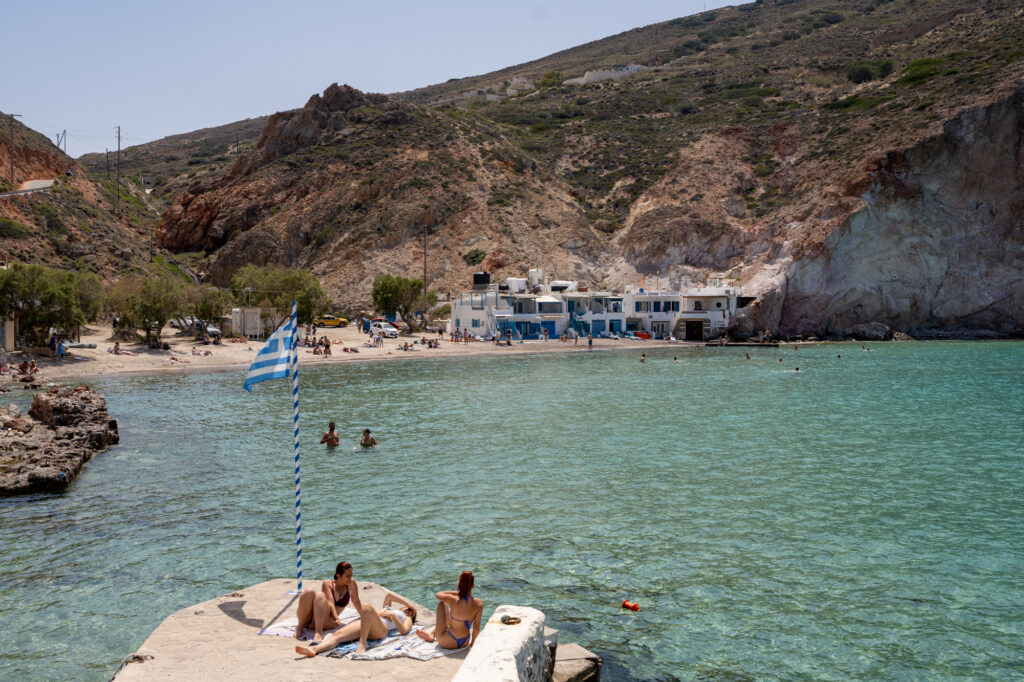
Milos is an island for romantics, friends seeking downtime and families who want a laid-back beach holiday away from throngs of tourists. It’s a safe place for solo travellers too, and if your visit is timed well, the island hosts several lively festivals and feasts at Easter, and from July through September.
Best Places to Stay in Milos
Choosing where to stay in Milos depends on your holiday mood. If you’re the type to stay put and only take the occasional outing, you can choose a charming fishing hut with doors opening out onto the Aegean Sea. However, if you’re more the exploring type, you’ll want a base with good road access to get out & about. Here are my top picks of where to stay in Milos (including where I stayed!).
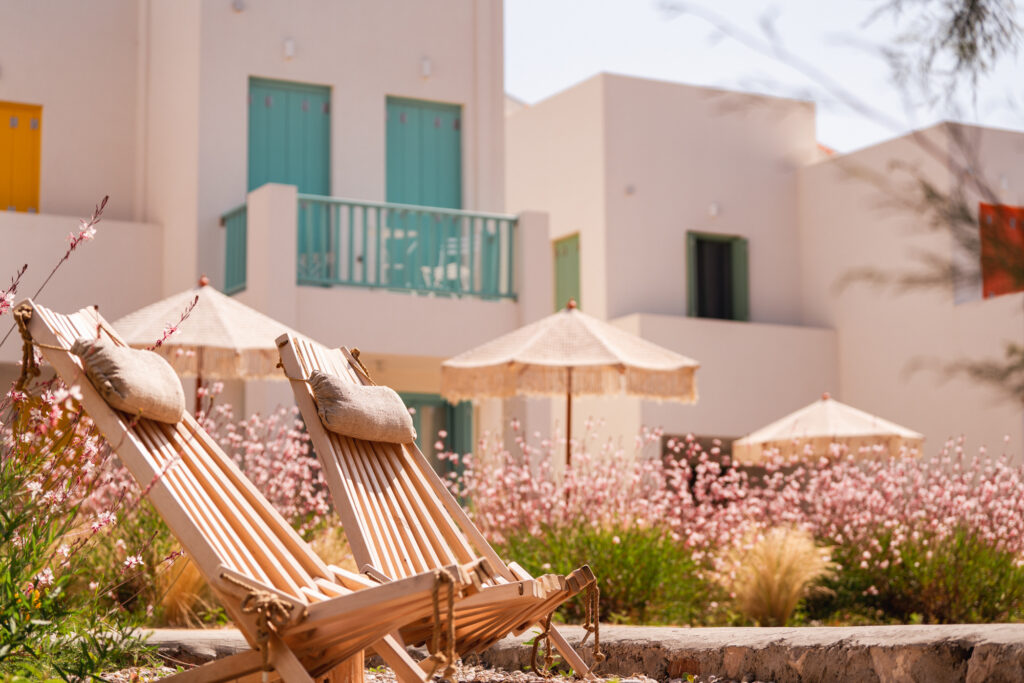
Domes White Coast Milos offers luxurious sea-view rooms with private plunge pools. Located near the famous Sarakiniko beach, it’s located near the main road in the northern part of the island, making day trips easy & fun.
Aquanis Anchored is located in one of the prettiest bays in Milos. This seafront house offers a unique place to stay in Milos, where you can launch yourself into the aquamarine water from your front doorstep. The road into Firopotamos isn’t bad, and there are plenty of nearby beaches and coves to explore for a change of scenery.
L’arco Milos Suite is the most convenient option for a central stay in Milos, and where I chose as my base. If you’re planning on exploring or taking tours (I can recommend this boat trip!) this one-bedroom apartment is ideal.
Read More: Best Places to Stay in Milos, Greece
Top Things to do on Milos Island
If you’re searching for what to do in Milos, the following should help inspire your itinerary planning. But remember to leave room for spontaneous adventures and following unknown paths too! Let’s get started..
Wander the Streets of Plaka
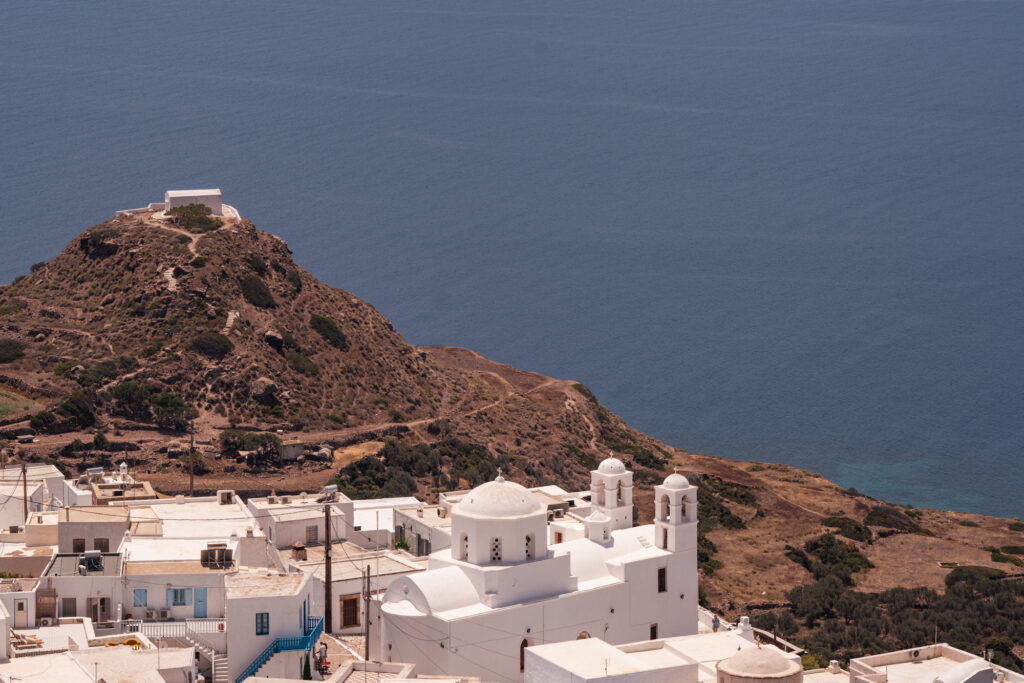
If the image you’ve had in your mind of Greek island towns includes white-washed Cycladic houses framed with cobalt blue shutters and patios adorned with hot pink bougainvillaea, then you’re picturing one of the best places in Milos – the charming capital of Plaka.
Plaka is located at the highest point of the island, and the town is one of two halves. The old town sits on a hillside formed by volcanic rock and tucked away within the remnants of crumbling 13th-century castle walls. It was built in such a way as to protect villagers from incoming pirates and invaders.
Plaka Castle is also one of the most beautiful places to watch the sunset in Milos. The spectacular views sweep across the entire island from here, so don’t forget to bring a camera.
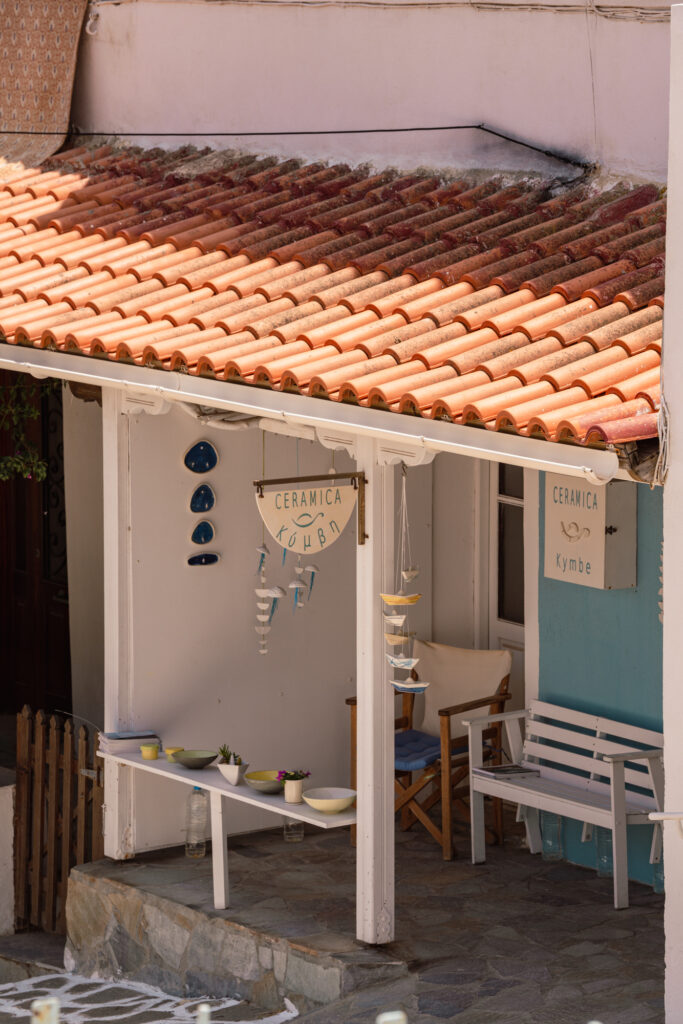
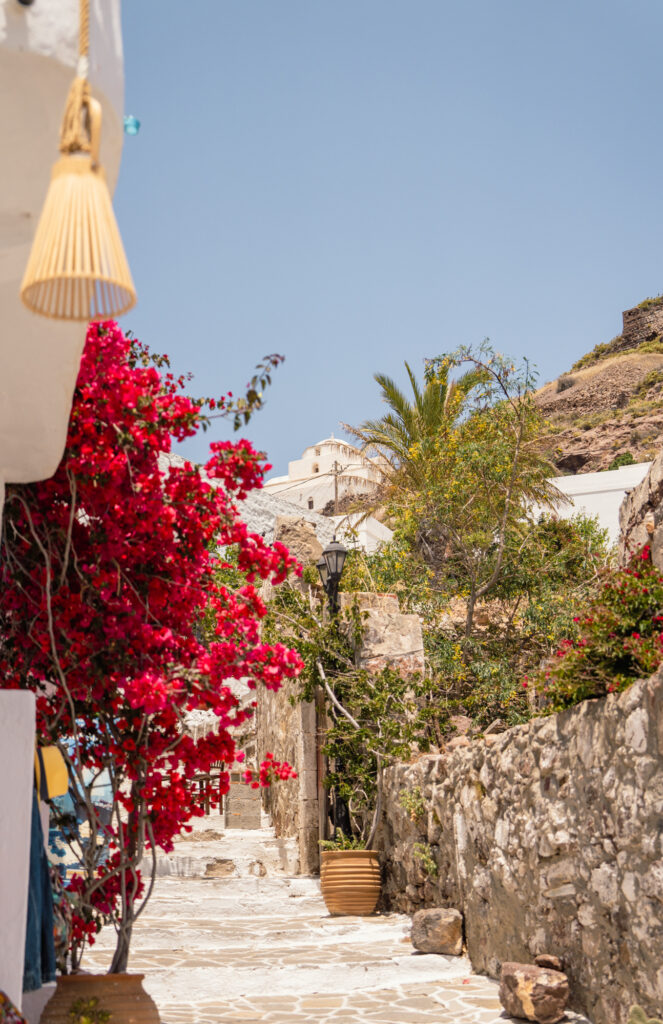
Below the old town, the newer area brims with traditional ivy-clad tavernas, cafes, handicraft shops and pretty churches like Panagia Korfiatsa. The church dates to 1820 and is filled with wooden epitaphs and relics.
In Plaka’s main town square, the neo-classical Archaeological Museum of Milos stands proudly with collections of Bronze Age artefacts and displays of Cycladic art inside. It’s also where visitors can see a replica of the iconic Venus de Milo statue discovered on the island – the original is in the Louvre Museum in Paris.
Visit Kleftiko & the Sea Caves
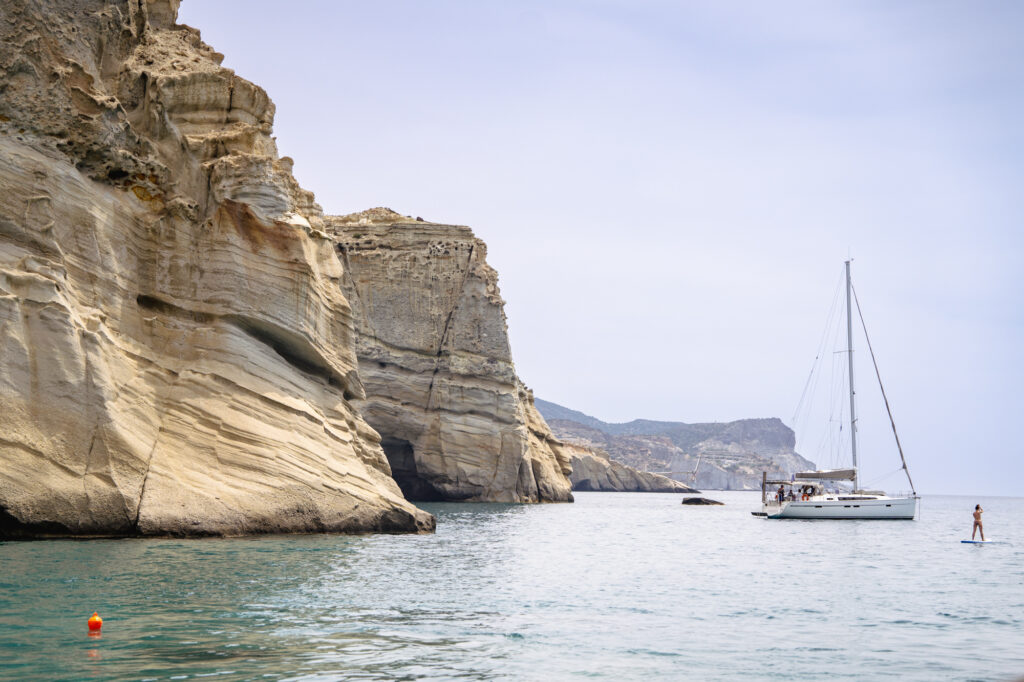
On the south side of the island, Kleftiko impresses with huge unique rock formations rising from the sea. Many visitors will recognise the scene, as these landscapes have graced the covers of many a Greek tourist guide or magazine.
The nearby sea caves are steeped in myths and legends and the word ‘Kleftiko’ derives from ‘to steal’ – a fitting name, as these Milos caves were once hideout spaces for pirates and smugglers. Legend has it that their treasures still lie within…
Book your boat tour to Kleftiko here.
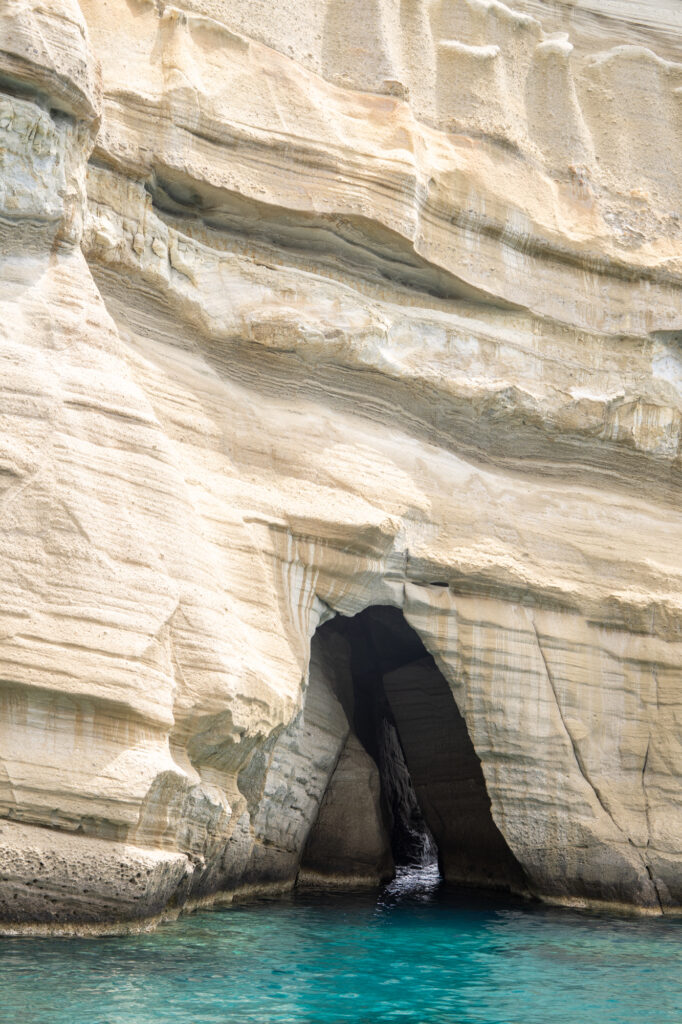
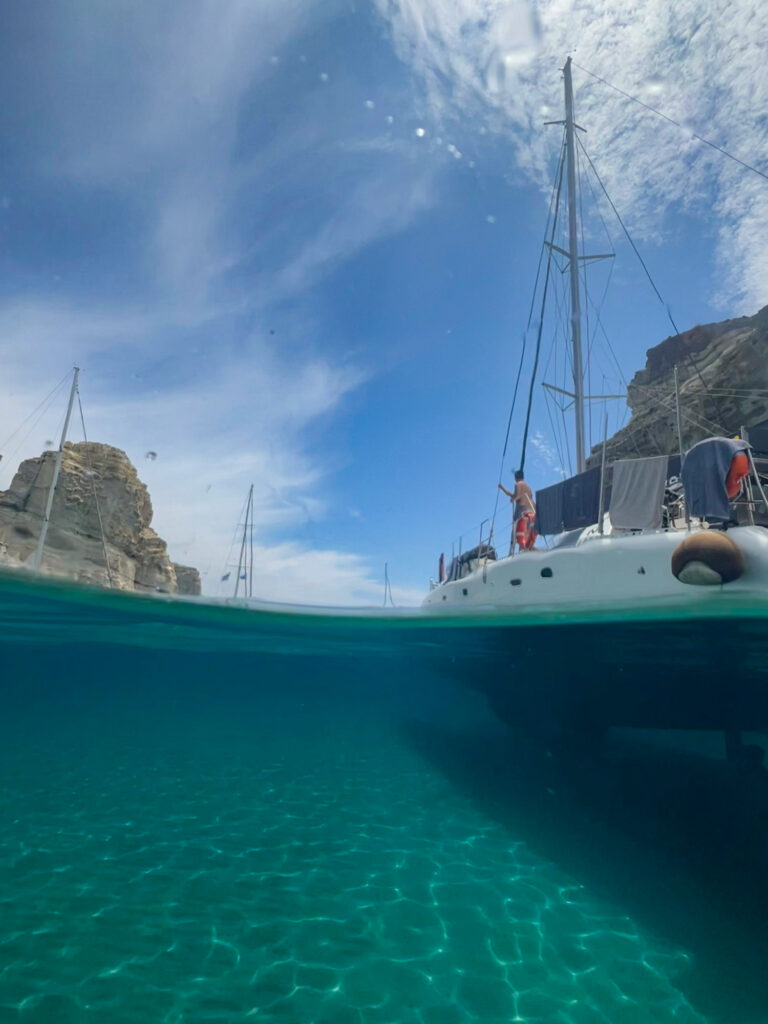
Most boat excursions also stop off at Sikia Cave – one of the top things to see in Milos. The water inside the cave is a beautiful shade of emerald and blue, and crystal clear for snorkelling. The sun’s rays stream through a hole in the cave roof and there’s even a small beach for relaxation inside.
Sunbathe on Greece’s Best Beaches
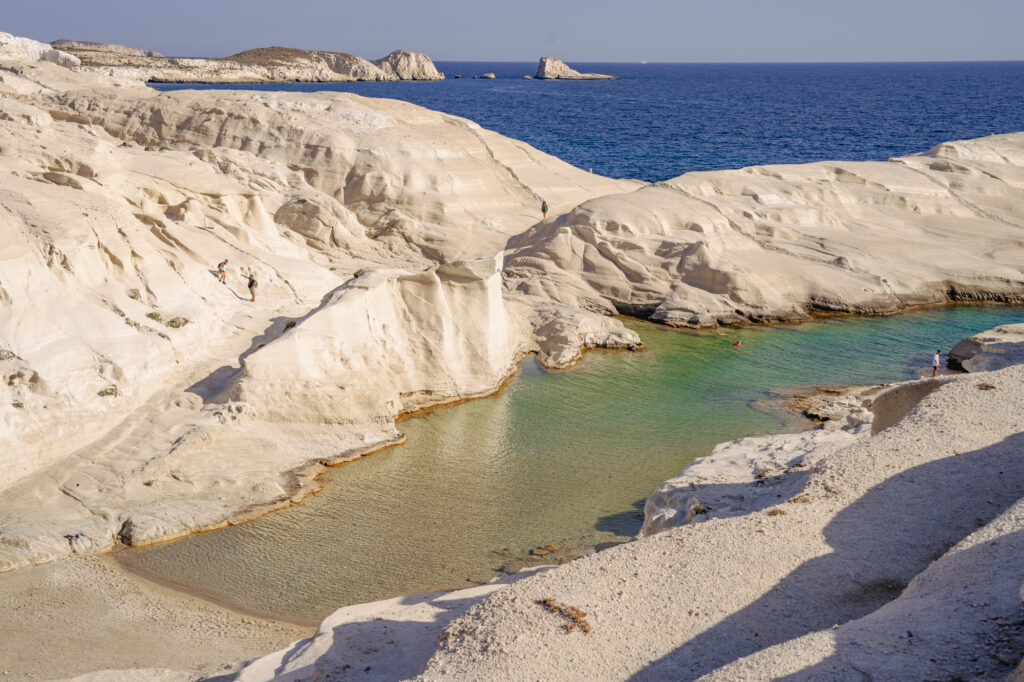
Milos Island has around 70 beautiful beaches – each one of them unique and different from the next.
One of the best beaches in Milos by visual standards is Sarakiniko Beach. Set in a horseshoe bay, it’s surrounded by lunar rock formations in the purest shade of white, and the sea is so clear that it’s possible to view the seabed and marine life below the water’s surface.
Firopotamos Beach near Plaka is also one of the top Milos Island attractions. This beautiful spot is surrounded by greenery, with a beach bar serving drinks and snacks. It sits aside a small fishing village with ‘Syrmata’ boat houses embedded into the rocks and is particularly charming if arriving early as the boats come in.
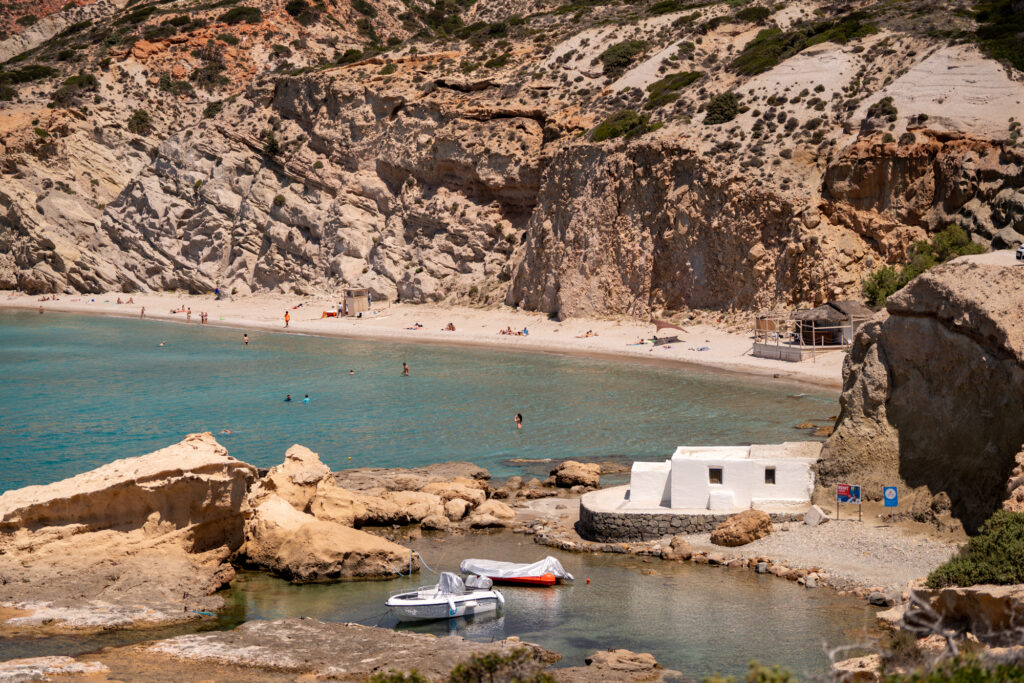
Looking for a family-friendly beach in Milos? Firiplaka Beach is a great choice. The long stretch of sand is flanked by colourful volcanic rocks with clear shallow waters and amenities such as parasols, sunbeds and a small beach bar.
Couples seeking solitude can opt to spend a day at Tsigrado Beach hemmed in by rock formations and accessed via boat or a rope and ladder! The sea is the brightest turquoise blue and is perfect for swimming and snorkelling. Access to the beach is not for the faint-hearted…but it’s fantastic for Instagram photos.
Read more about the best beaches in Milos here.
Hike the Highest Mountain in Milos
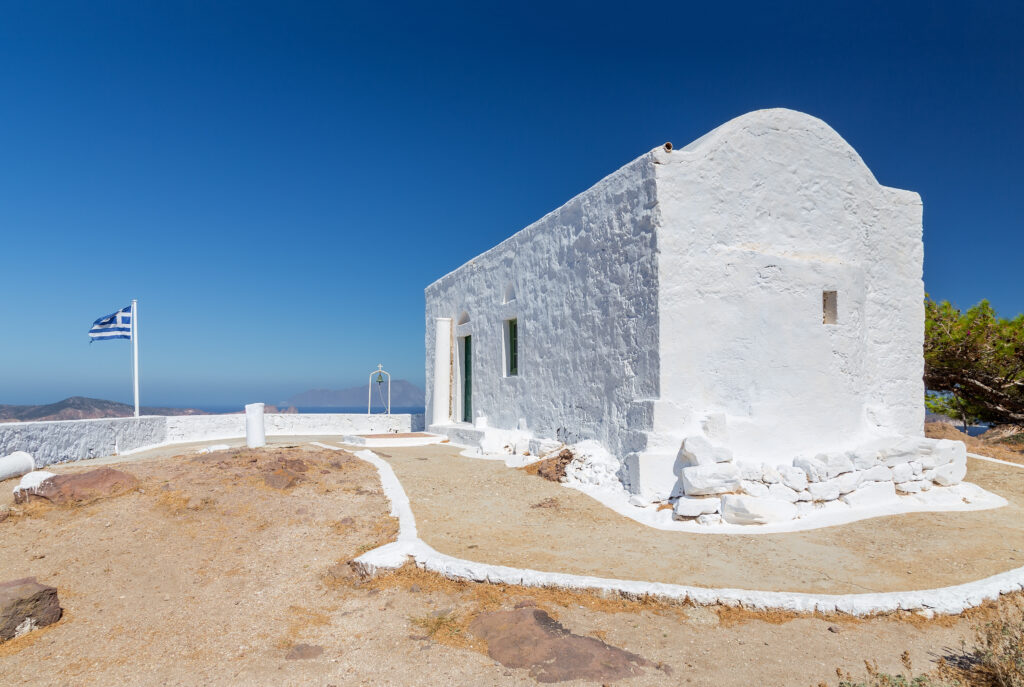
Profitis Ilias Mountain towers over the island at a height of 748 metres and its peak can be seen from all over the island of Milos.
The loop trail from Agia Marina in the Halakas area to the summit of Profitis Ilias takes around four hours to complete and is just over seven kilometres in total. It’s quite challenging but suitable for intermediate and seasoned hikers (check out the route here).
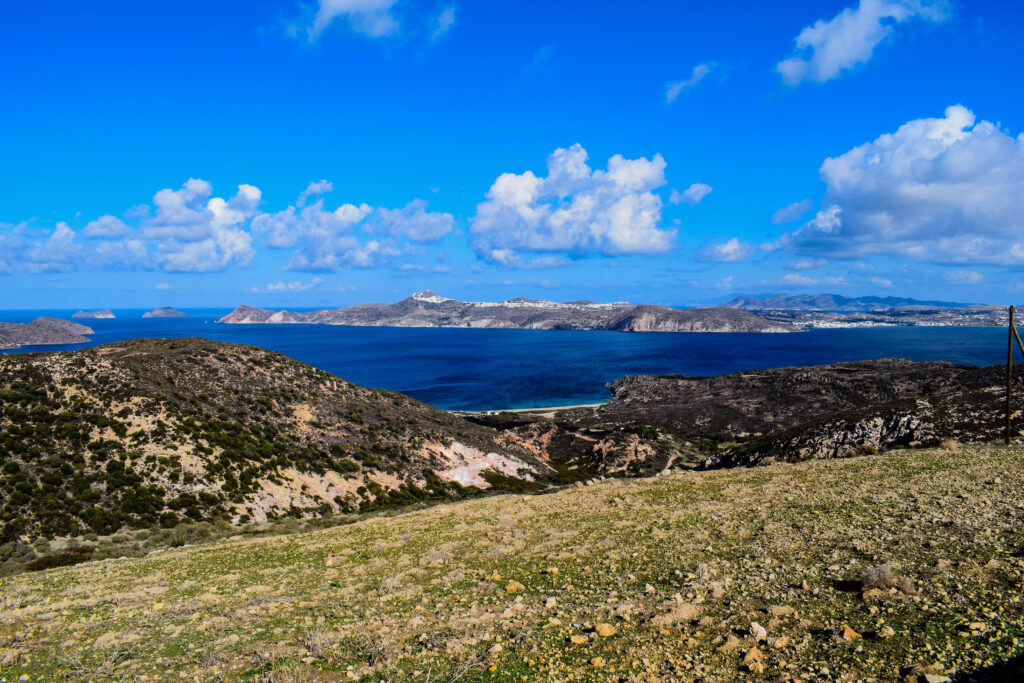
On the southwest mountain route, hikers will be greeted by wildflowers and curious mountain goats as they head towards the Chapel of Profitis Ilias at the top. The views are breathtaking from this, the island’s highest point, as they stretch across Milos and as far as neighbouring Kimolos Island.
One thing to note if planning to hike the trail, is that there’s no shade, so time your journey well, bring drinks, snacks, hats, and wear comfortable shoes!
Step Back in Time at the Ancient Theatre of Trypiti
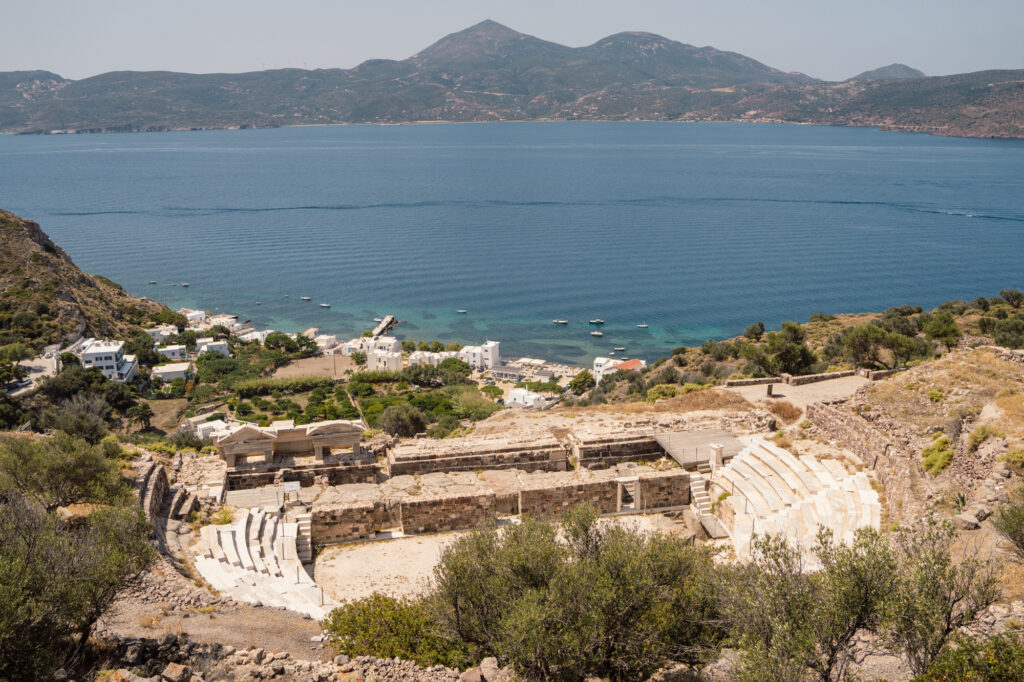
One of the best things to visit in Milos, particularly for those interested in archaeology or history is the Ancient Theatre of Trypiti (Tripiti).
The ancient amphitheatre sits on a hillside just below the village of Tryptit and once held an audience of 7000 people. The original structure that stood on the site is thought to have been built around the 3rd century B.C., however, the one that stands was constructed on the ruins during Roman times.
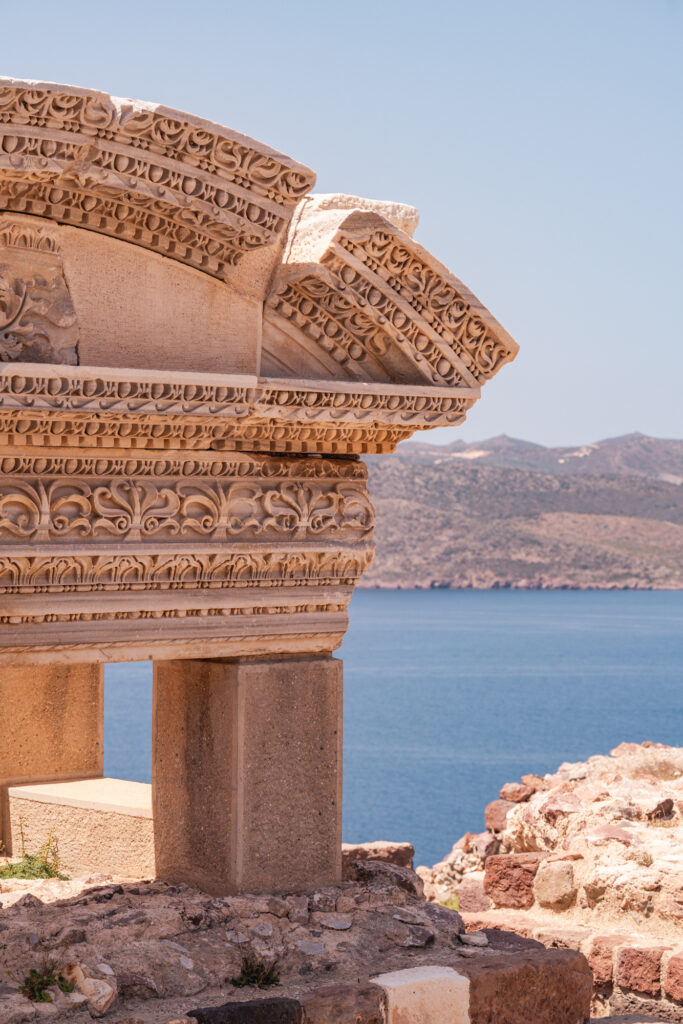
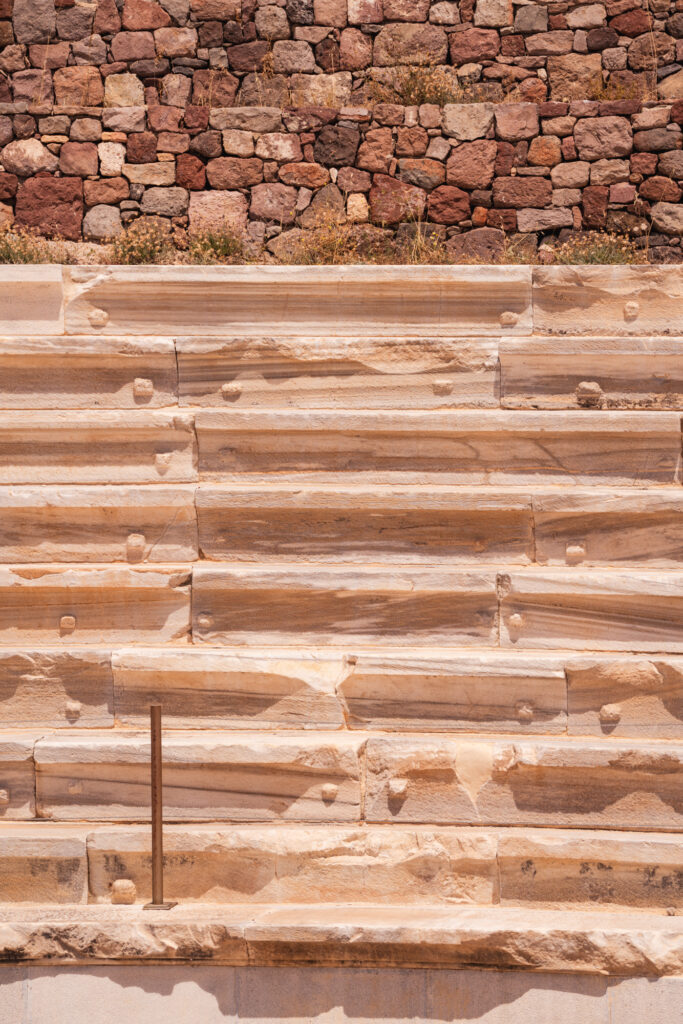
Today, parts of the stage, tiered seating and areas where the orchestra once played still exist, and although the capacity is now just several hundred people, the impressive theatre is still used to hold music and dramatic performances throughout the year.
The surrounding countryside is still being excavated, as archaeologists seek to discover more treasures, plus, it was near here that the Parian marble statue of Venus de Milo was unearthed, so it will be interesting to see what is uncovered in the future!
Explore the Underground Catacombs of Milos
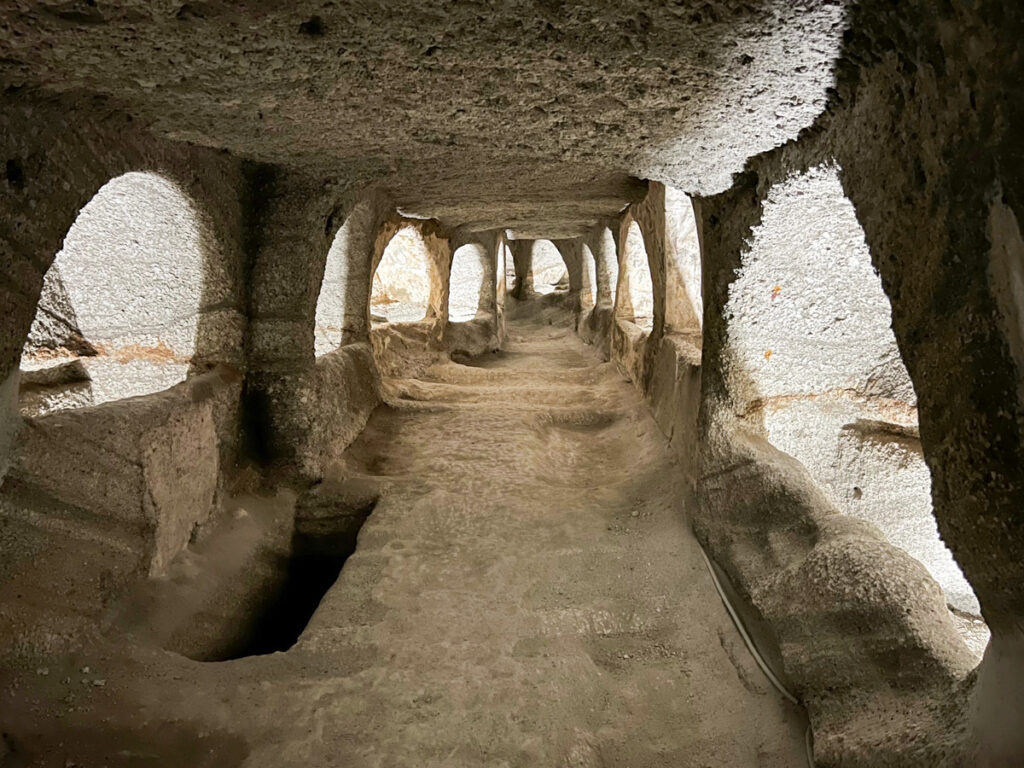
Close to the Ancient Theatre and a five-minute drive south of Plaka, you’ll discover the Underground Catacombs of Milos. The word ‘catacomb’ comes from cavernous areas near the Tiber River in Rome and this important archaeological site is one of the top Milos attractions.
Although they were only discovered in the mid-1800s, these mysterious catacombs are said to date to the latter part of the 1st century – used as underground Christian cemeteries and churches during Roman times.
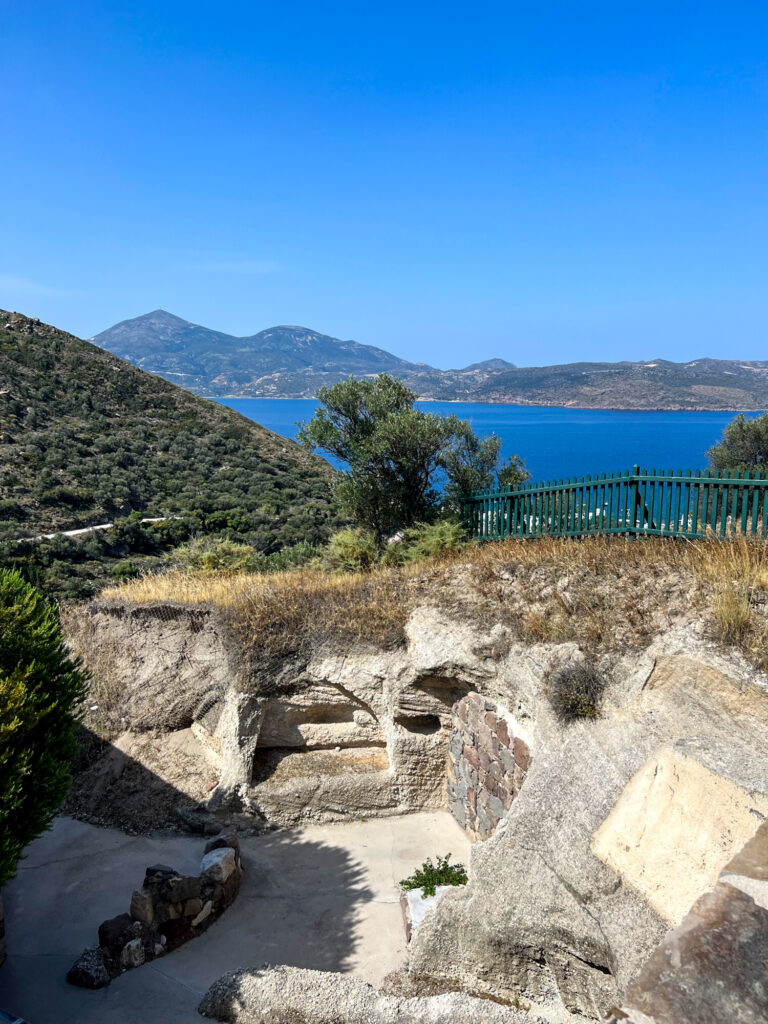
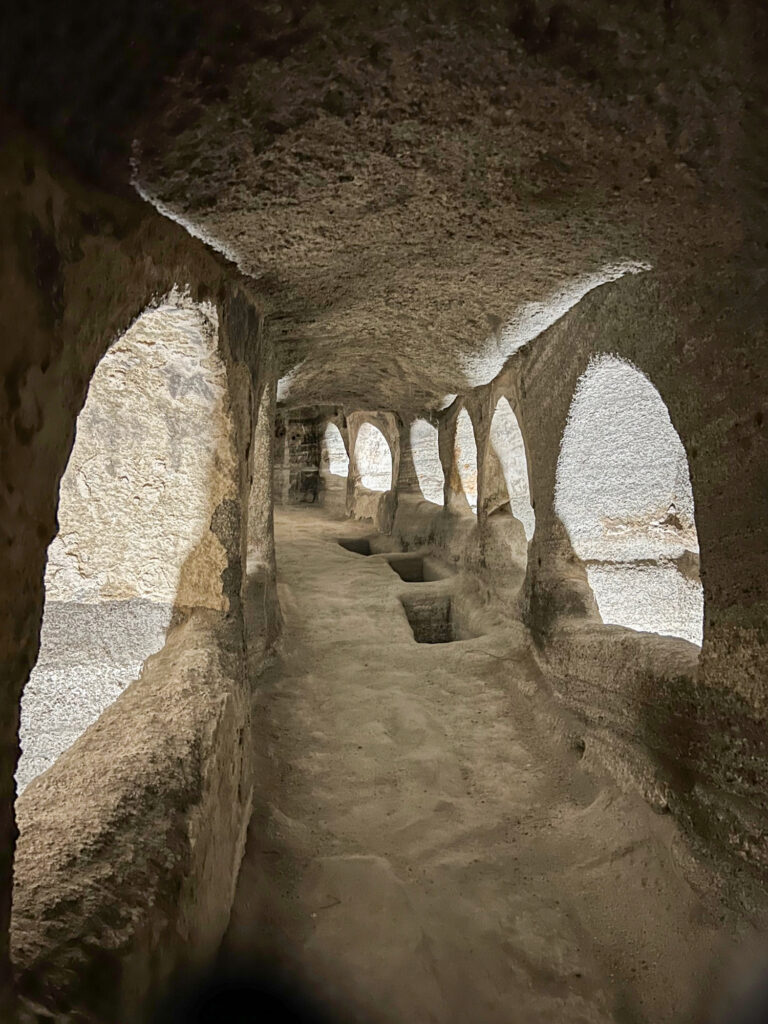
Wander through atmospheric arcaded tunnels, along constructed walkways and explore three interconnected catacombs on a short guided tour. Learn about plundering pirates and conquering nations attempting to steal jewels from the tombs and see the places where Christians fleeing from persecution would seek refuge.
If you look carefully, it’s possible to still make out inscriptions and secret messages they etched for each other on the walls…
Best Day Trips from Milos
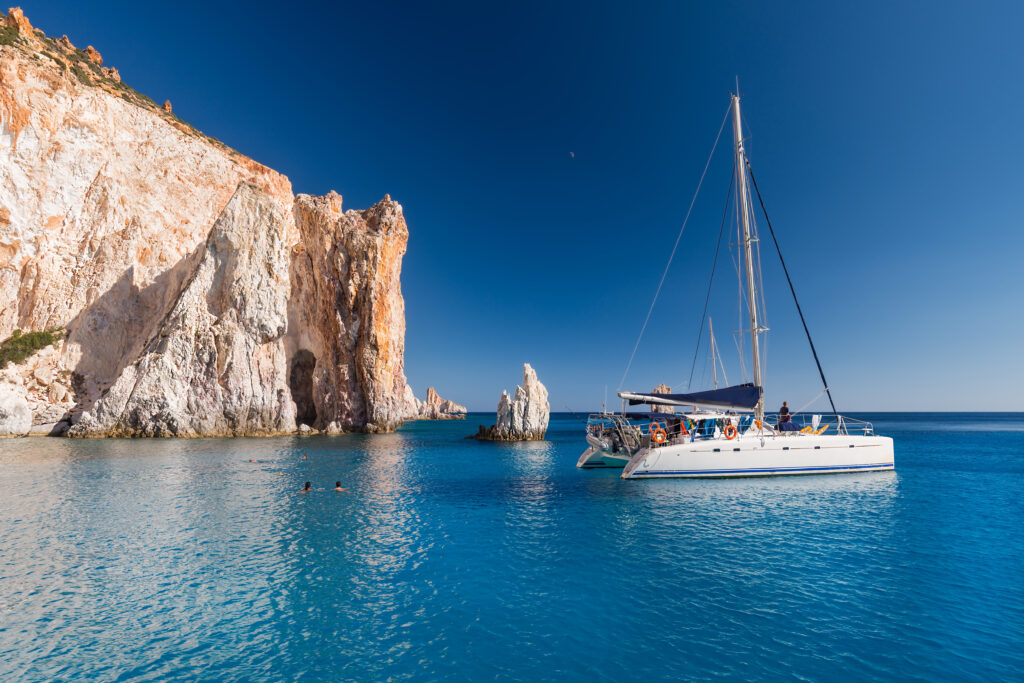
There are dozens of exciting Milos excursions for history and archaeology lovers, foodies and families.
A boat tour will transport you to neighbouring Poliegos Island. The island is uninhabited by humans, only goats live there, and it was mentioned in historical texts by Pliny the Elder and Ptolemy. It’s a great place to relax on unspoilt beaches, snorkel and delve into sea caves, which, at certain times of the year, provide a home to monk seals.
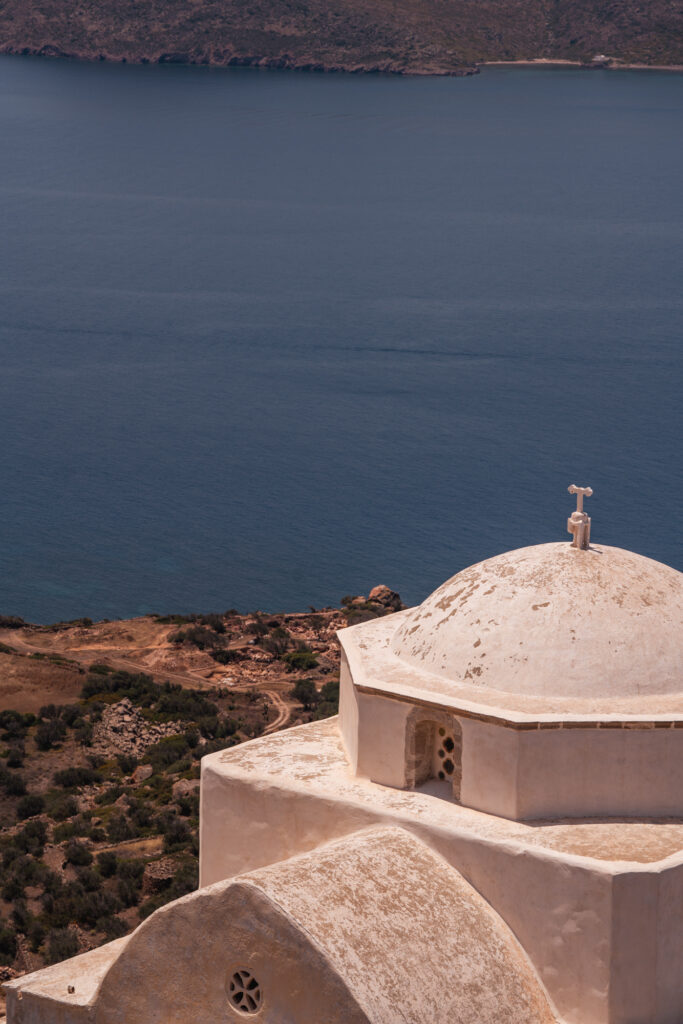
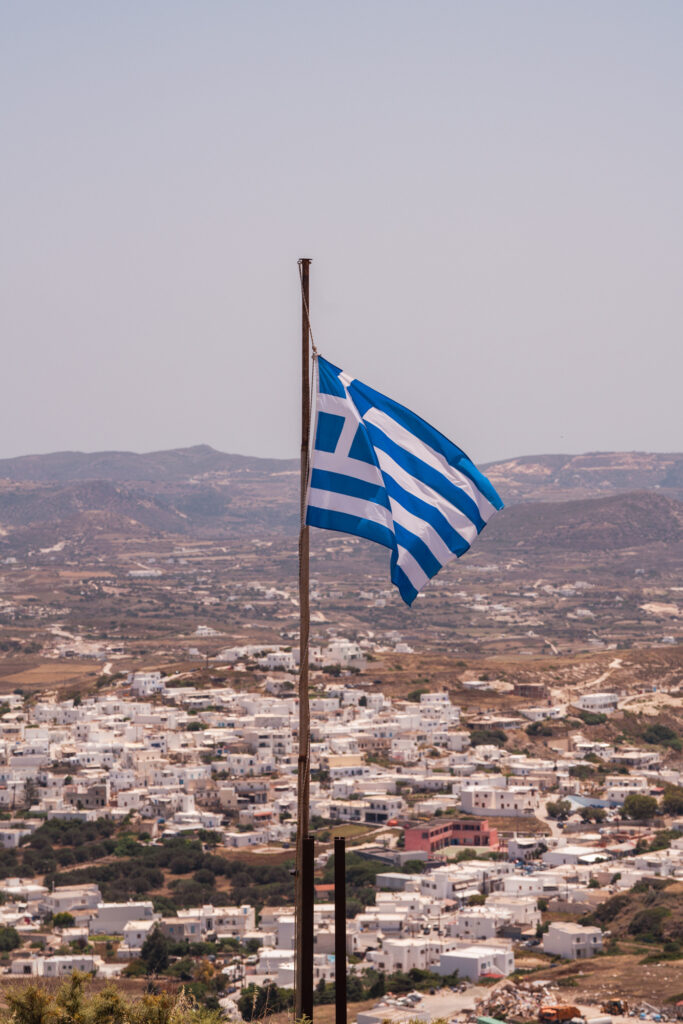
If learning about the island’s history is appealing, book an archaeological and cultural tour which takes in top sights such as the Ancient Theatre of Milos, the Papafragas caves, and the Bronze Age settlement of Phylakopi.
If sampling Greek food and drink is high on your list of holiday priorities, a winery tour may appeal. Dedicated trips include visiting a family-run winery in Pollonia to learn about wine production, plus, you’ll explore the vineyards and enjoy a few glasses accompanied by local delicacies.
Explore Milos Coast in a Sea Kayak
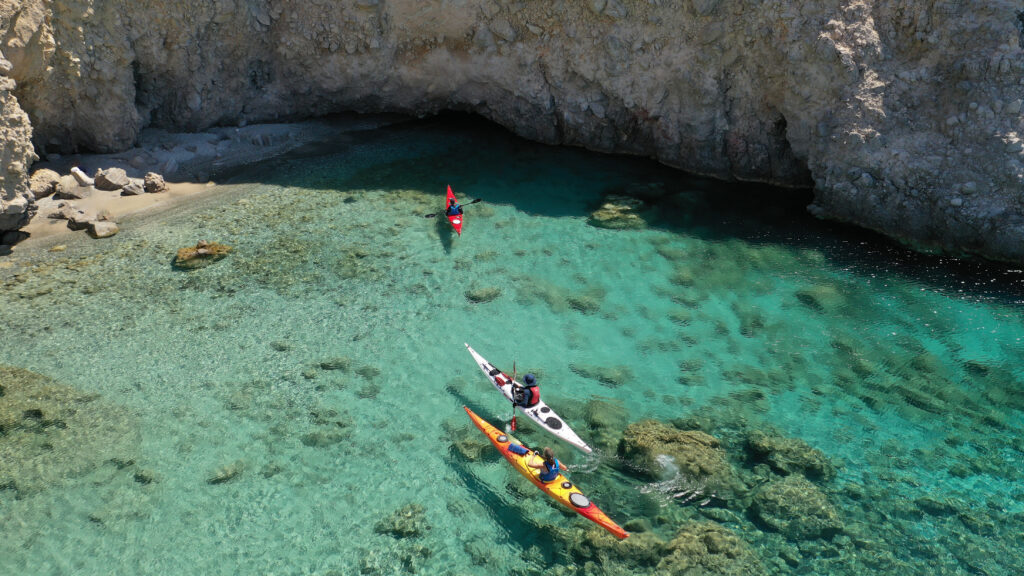
Milos has a stunning coastline and one of the best ways to see it is via sea kayak. Glide along the water at your own pace, through rocky tunnels and archways, explore sea caves where pirates once hid, and snorkel near secluded beaches in clear waters.
Although several coastal routes are available, a popular one to book departs from the picturesque Fyriplaka Beach (below) and takes you to the pristine waters of Tsigrado Beach, and the secluded Gerakas Beach before returning to Fyriplaka. Book it here.
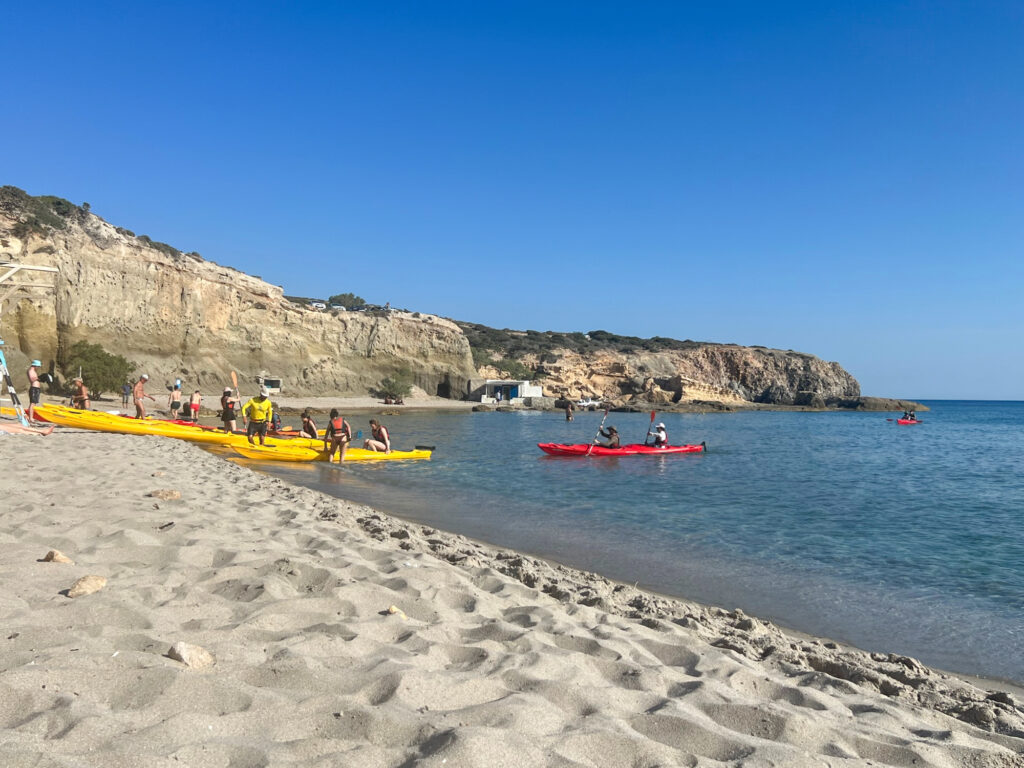
Alternatively, head for Paleochori to relax and swim in thermal springs or incorporate a sea kayaking trip with a visit to Milos Sulphur Mines.
Guided trips are available from April to late October, but if you’re travelling out of season, they can also be organised upon request for adults and children over 12.
Discover the Museums of Adamas
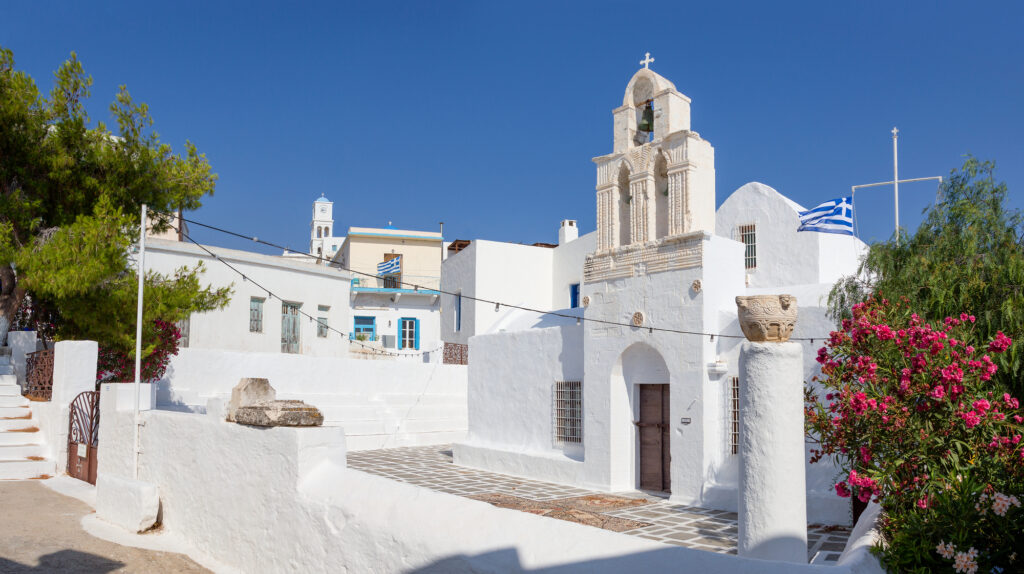
Adamas (Adamantas) is one of the island’s biggest towns, with a bustling port, great restaurants, a smattering of nightlife, and lots of charming boutiques.
The town was founded in the early 1800s by a group of Cretans who crossed the sea to Milos, and it boasts some of the best museums on the island including an interesting Maritime Museum holding collections of ancient equipment, ship instruments, old maps, and a wooden boat.
The Milos Mining Museum is also high on the list of interesting things to see in Milos. The island’s mining heritage dates as far back as the Neolithic period, and unbeknown to many, it was the premier supplier of obsidian for other Mediterranean countries.
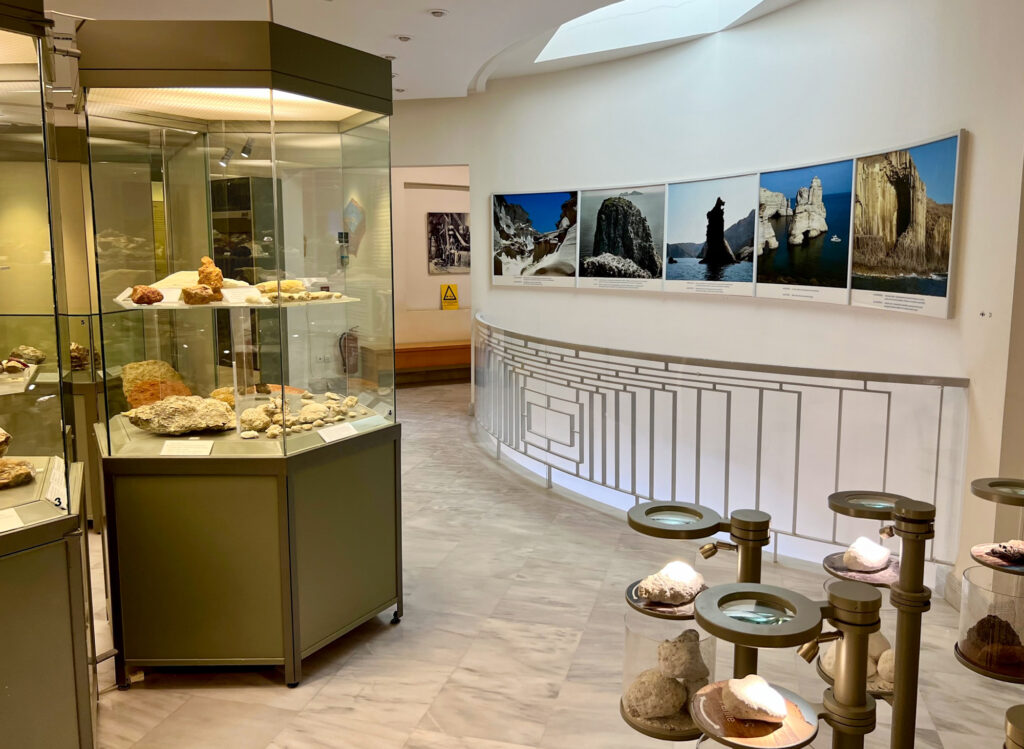
On display, you’ll see the role that various minerals still play in our lives, see collections of pre-historic tools made from obsidian, learn about how the mining industry has changed on the island throughout the centuries, and how the island is rehabilitating the now obsolete mines.
If you’re interested in learning about Greek religion, pop into the Ecclesiastical Museum inside the Church of Aghia Triada. The pretty white church showcases wooden carvings, a mosaic floor and relics dating to the 14th century.
Stay in a Syrmata
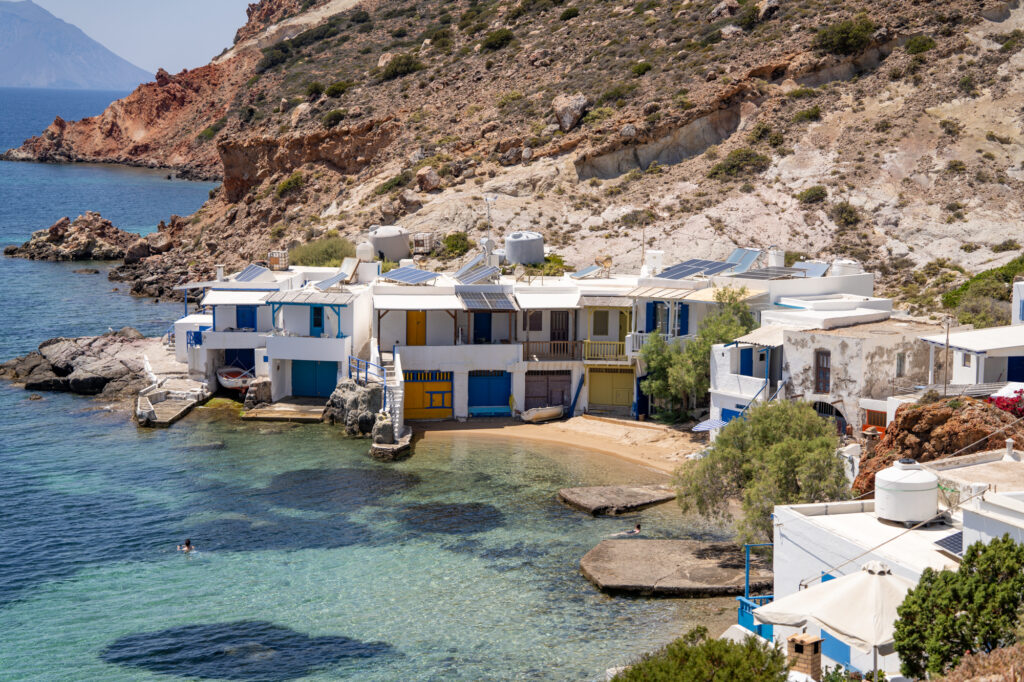
A fisherman’s hut in Milos is known as a ‘Syrma’ and the island is dotted with unique houses like this – the great news is, visitors can book to stay in them!
The houses are carved into rocks by the beach, and in days gone by, the ground level was used to store fishing boats to protect them from the elements in winter. Most huts had a further floor above, where fishermen would spend summers with family members.
The ‘Syrmata’ houses are located in picturesque fishing villages on Milos, mainly Klima, Mandrakia, Emporios and Firopotamos Beach.
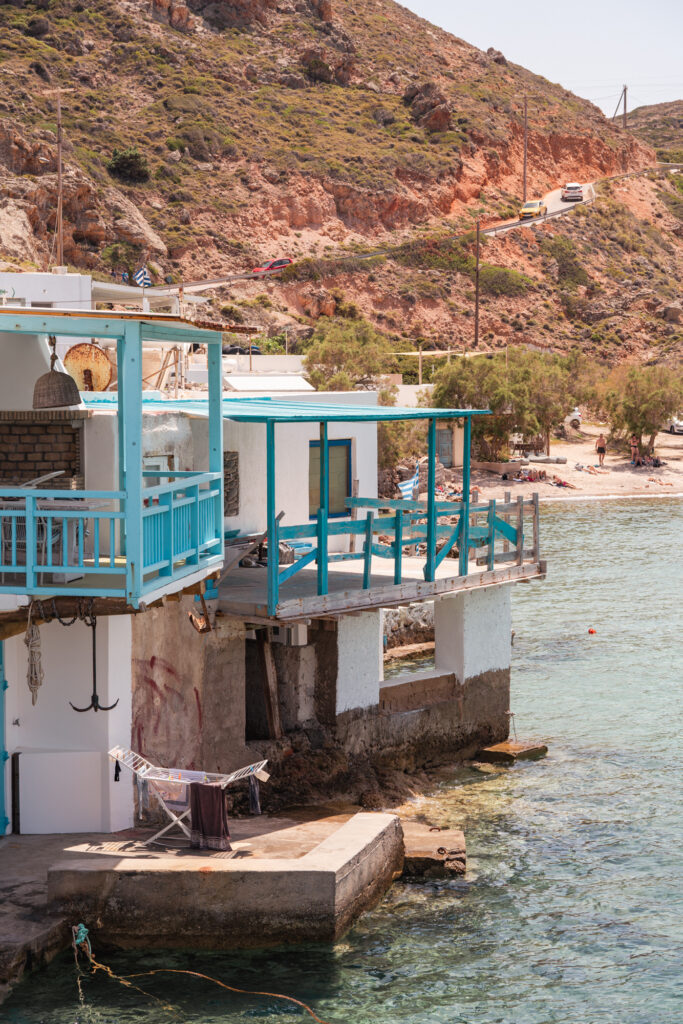
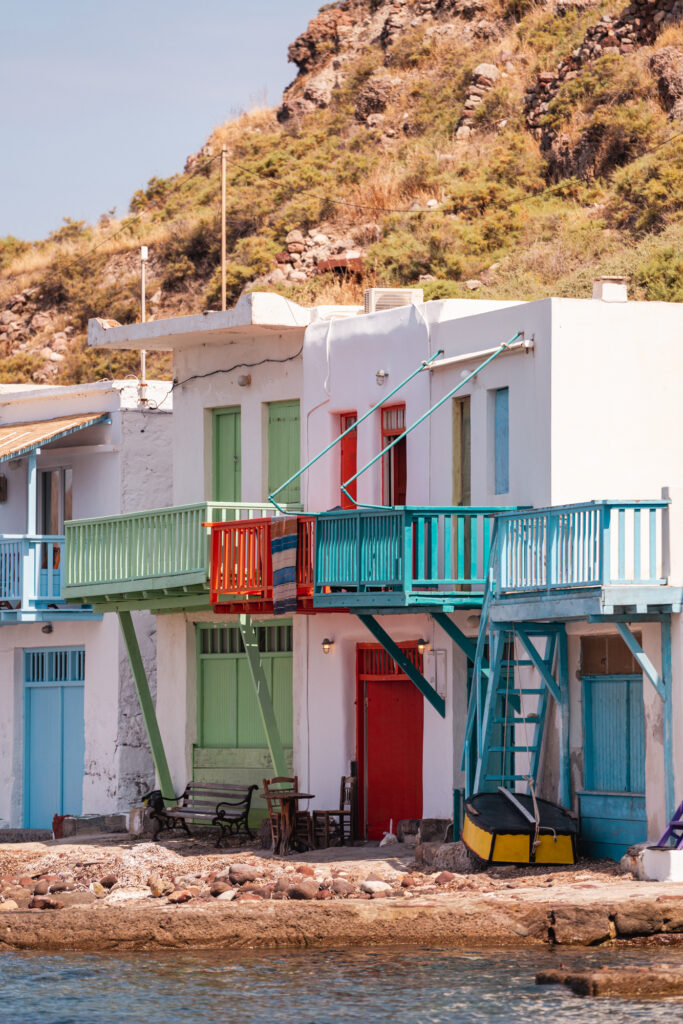
They are instantly recognizable by their white-washed facades with bright doors, windows and balconies, often coloured in blues, greens, yellows and reds left over from painting the fishing boats!
They offer an unusual stay for anyone wishing to immerse themselves in traditional Greek culture on a Milos vacation. Find my favourites here, here, and here!
Swim in Thermal Waters
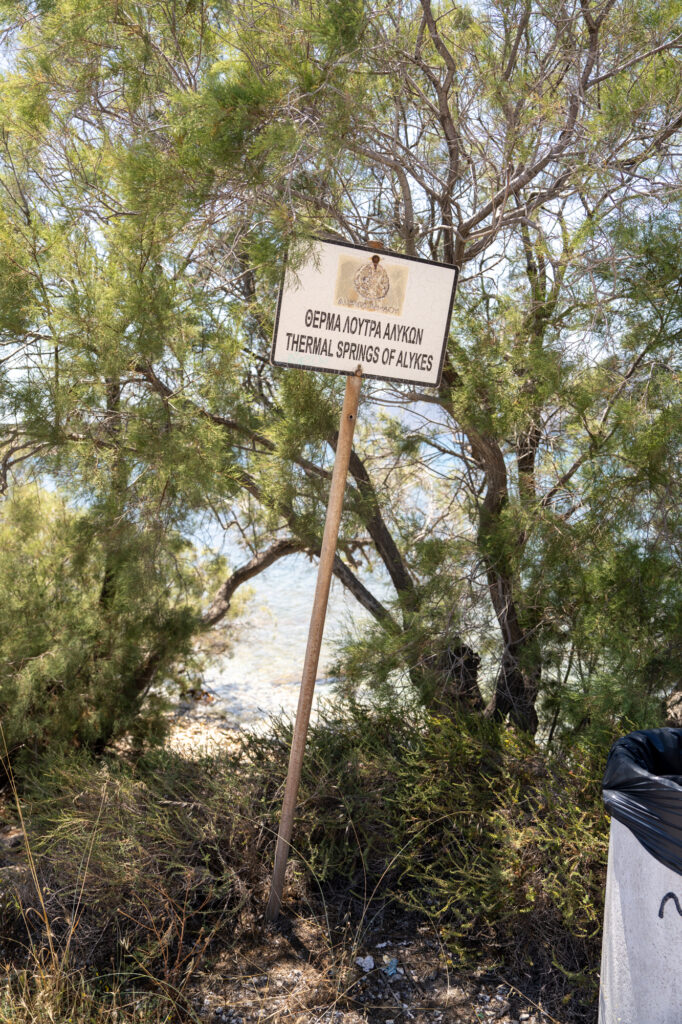
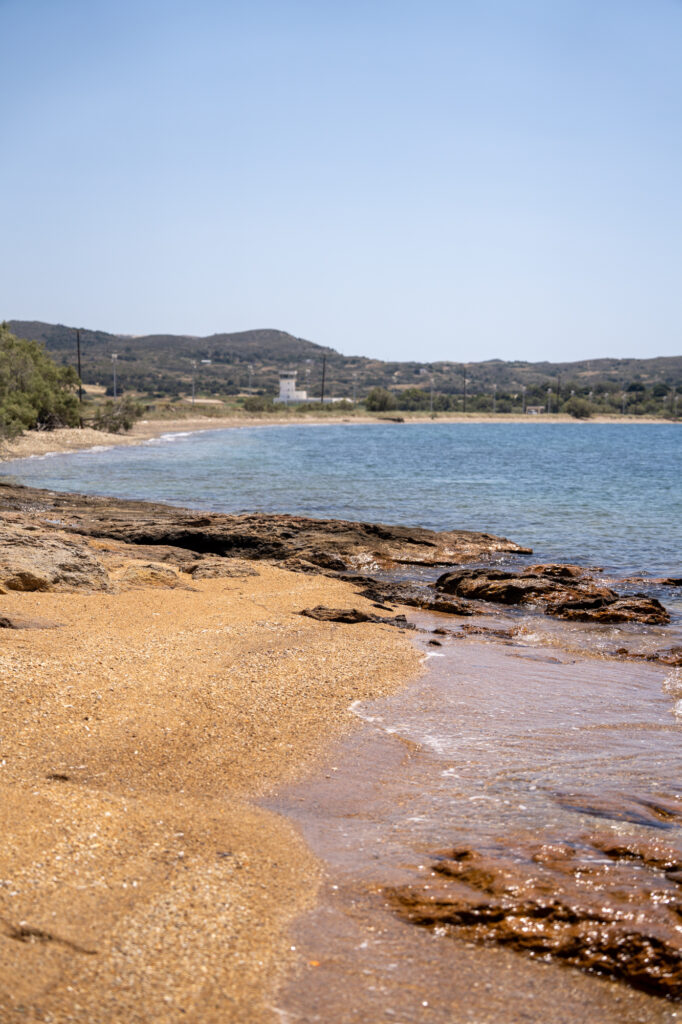
Milos is known for its volcanic environment and throughout the island there are little pockets of geothermal activity that create natural hot springs.
A popular spot with locals is the Thermal Springs of Alykes close to Milos airport. Visitors can spend time relaxing in the warm water here for free – as it’s a public beach.
Access can be a little tricky to find, as the only indication of the springs is the discreet sign shown above. But you can find the spot on Google Maps here. It’s also not the prettiest place to bathe on the island, but worth stopping off if you’re in the area.
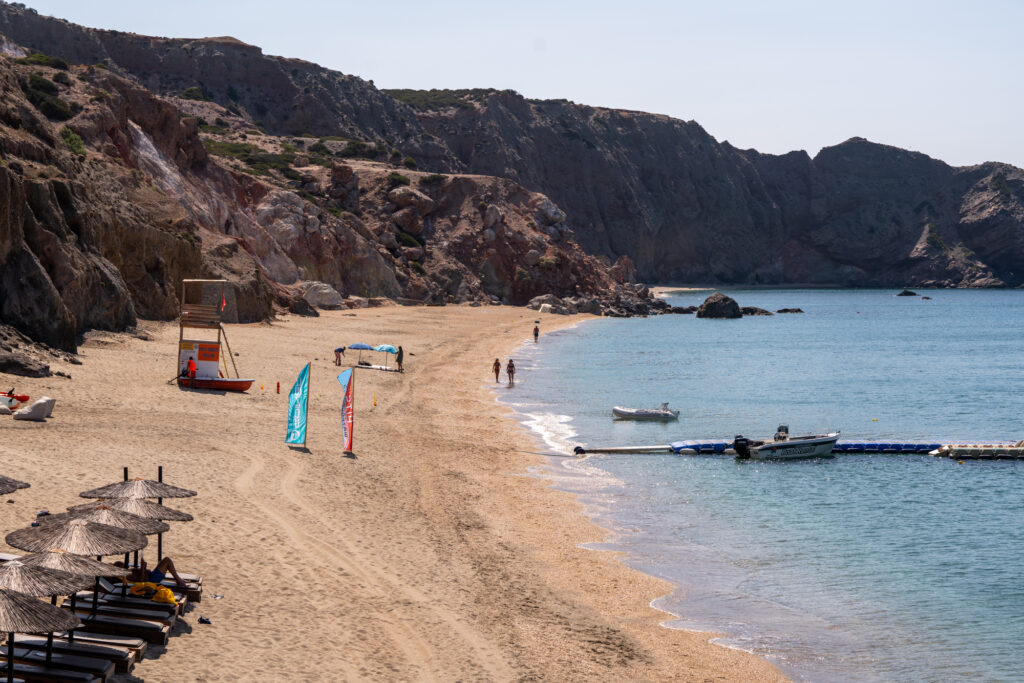
If you’re searching for a prettier thermal pool for swimming, hop aboard a private boat tour and let an experienced guide transport your party to the hidden thermal pools at Gerakas and Paliochori beaches.
Many places are only accessible by boat, but a general rule is to look for a golden reflection beneath the water, then go on a bubble hunt!
Jump on the Ferry to Kimolos
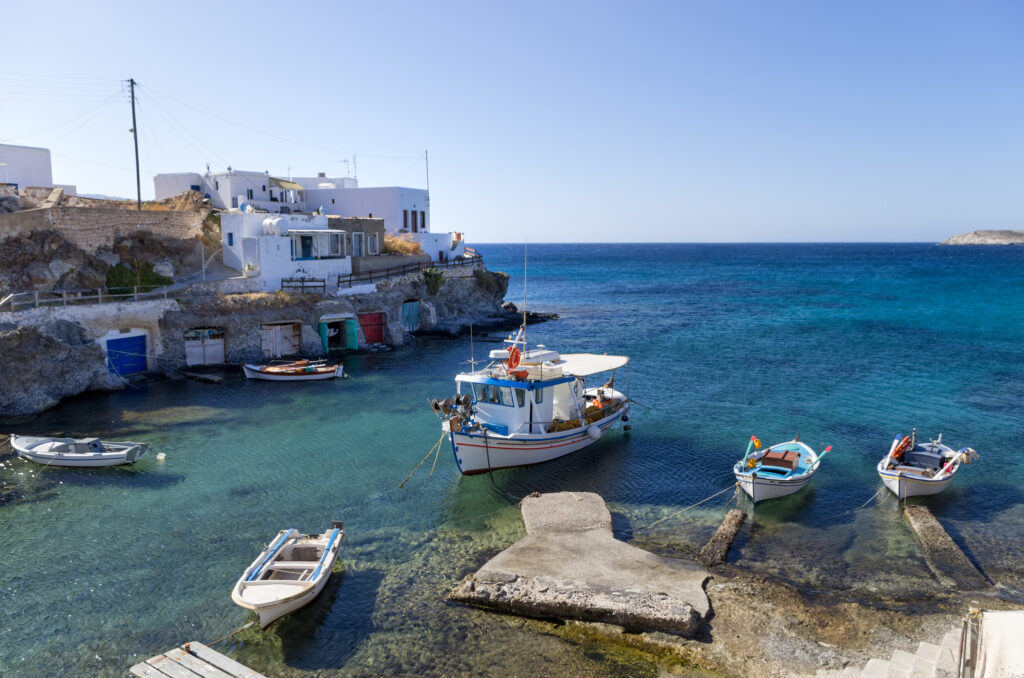
It takes just half an hour via local ferry to reach picture-perfect Kimolos and you’ll be able to tick another Greek island off your bucket list.
Kimolos is known for its relaxed atmosphere and postcard villages. This island is for scenic strolls through sleepy white-washed villages, lounging on quiet beaches, trying delicious ‘ladenia’ bread (topped with tomatoes, onions and olive oil), and chatting with locals.
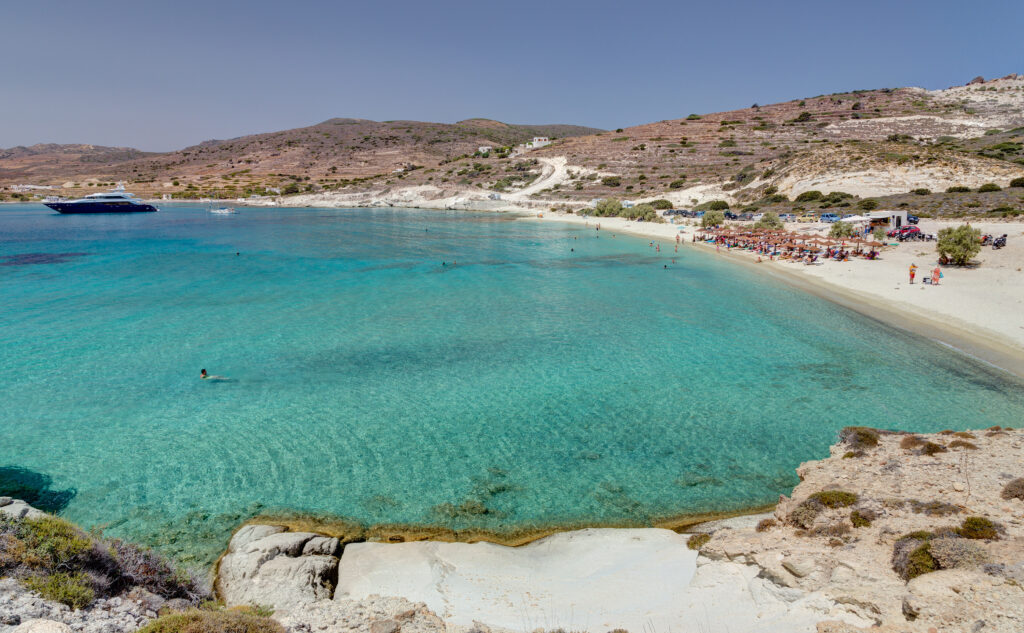
Swim at the picture-perfect cove of Prassa Beach, visit the Archaeological Museum to learn about the history of Kimolos and see the Kastro in the centre of Chora, the largest village on the island.
If time permits, hike to the crumbling Cycladic windmills at the summit of Xaplovouni hill, visit Goupa, a pretty fishing village, or simply remain in Psathi (the port) with its authentic Greek tavernas for lunch.
Foodie Trails in Milos
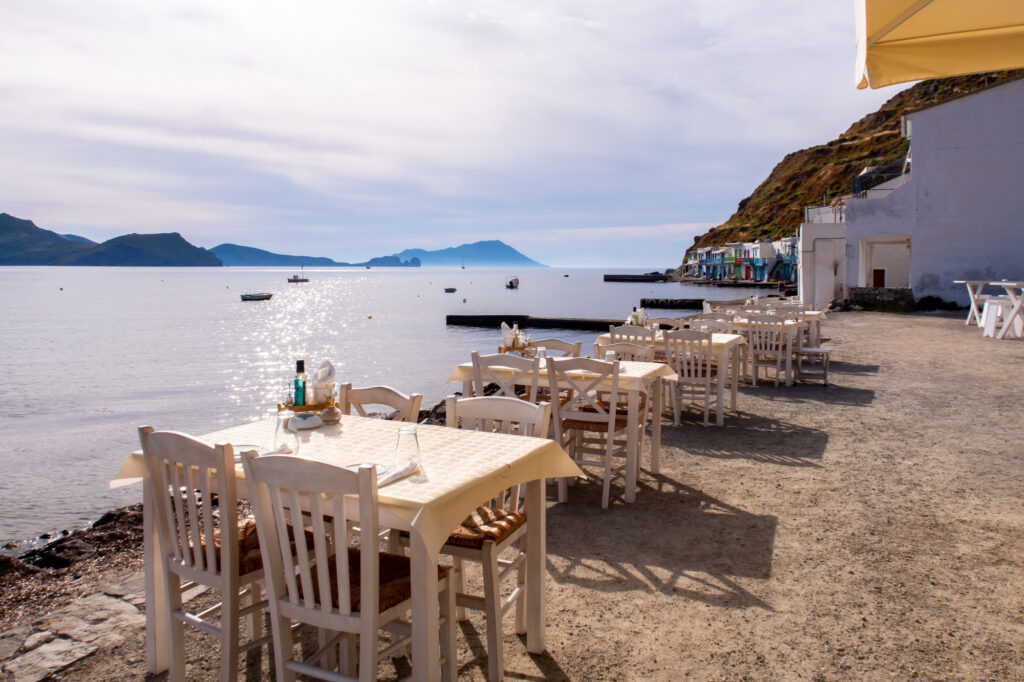
In Milos the culinary scene is bursting with vibrant Mediterranean flavours, often focused on local produce, grains, and cheeses. Famous for its vegetarian-friendly fare, one can savour hearty, sun-ripened vegetable dishes like “briám” (Greek ratatouille) and enjoy local cheeses like the soft, creamy “Melichloro”.
Another staple is the traditional “pitarakia”, small pies filled with cheese or vegetables, and freshly baked bread, all showcasing the island’s dedication to fresh, simple, and nutritious food.
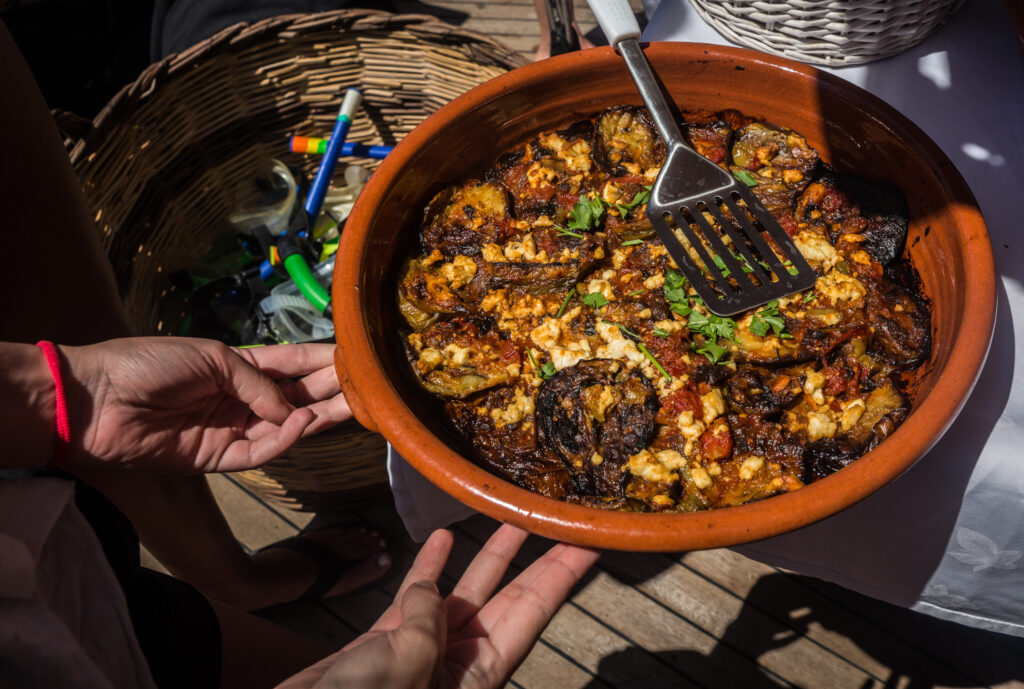
A delicious local dish known as ‘Ladera’ is a popular choice – cooked in olive oil, made from peas, green beans, aubergines, tomatoes and artichokes (shown above). As is the vegetable-based ‘ladenia’, a type of pizza/flatbread made with ripe tomatoes, onions, olive oil, and local herbs.
Try ‘Gigantes’ – huge white beans infused in a Mediterranean herby sauce and ‘Dolmadhes’ – rice stuffed vine leaves served cold with a squeeze of lemon juice.
Zip Around Milos on an ATV
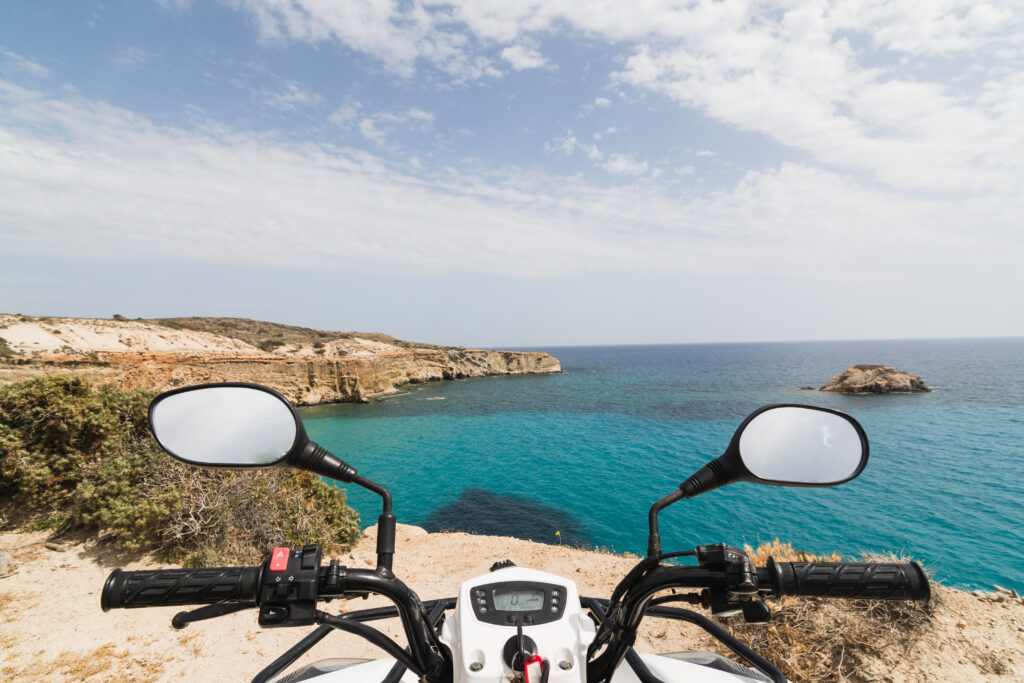
If hiring a car doesn’t appeal but you’re ready to explore the island further, consider renting an ATV (All-Terrain Vehicle) to get around instead.
This is one of the most fun activities in Milos and several companies in Adamas, Plaka and Pollonia hire them out by the day. If you’re travelling outside of peak season, booking is often not required.
Some of the best places to explore on your quad bike include the abandoned sulphur mines (although care is required on the road down), and the beaches of Firopotamos and Fourkovouni.
You’ll need a valid driver’s license, and the daily hire rate can be similar to a car rental, but with the wind in your hair and the sun on your skin, it’s one of the best ways to discover Milos!
Explore the Abandoned Sulfur Mines
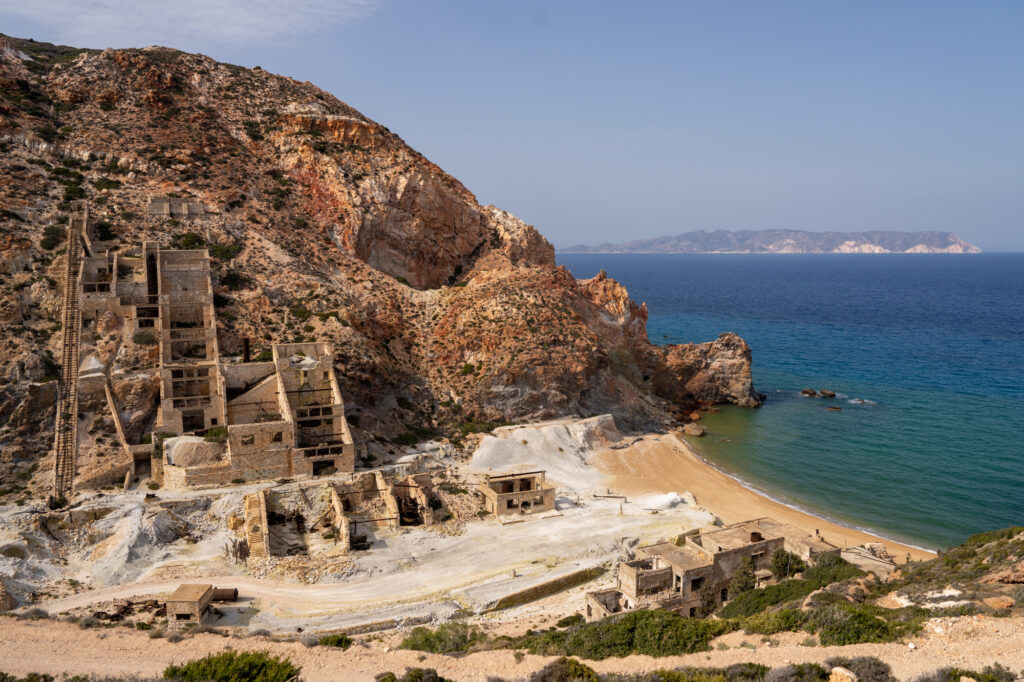
The Sulfur Mines are one of the best places in Milos for unique photo opportunities. The eerie abandoned mines are located on the east coast in Paliorema embedded into a russet volcanic rock face.
Long ago when sulphur was mined here, the place was a hive of industry, and although today it resembles a half-finished construction site, there’s much more to see than meets the eye.
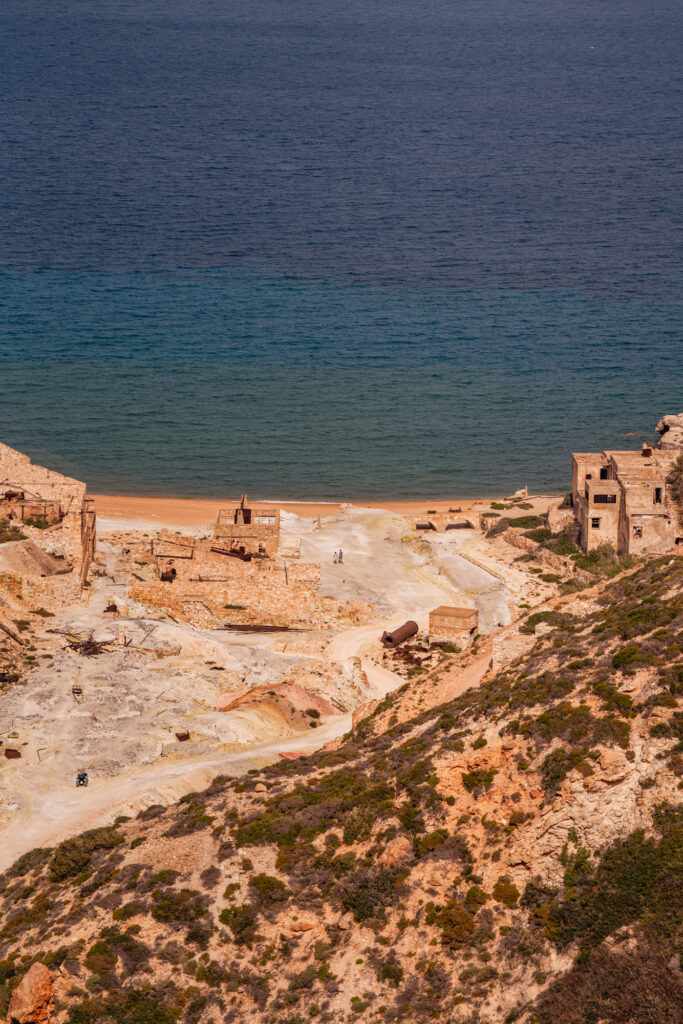
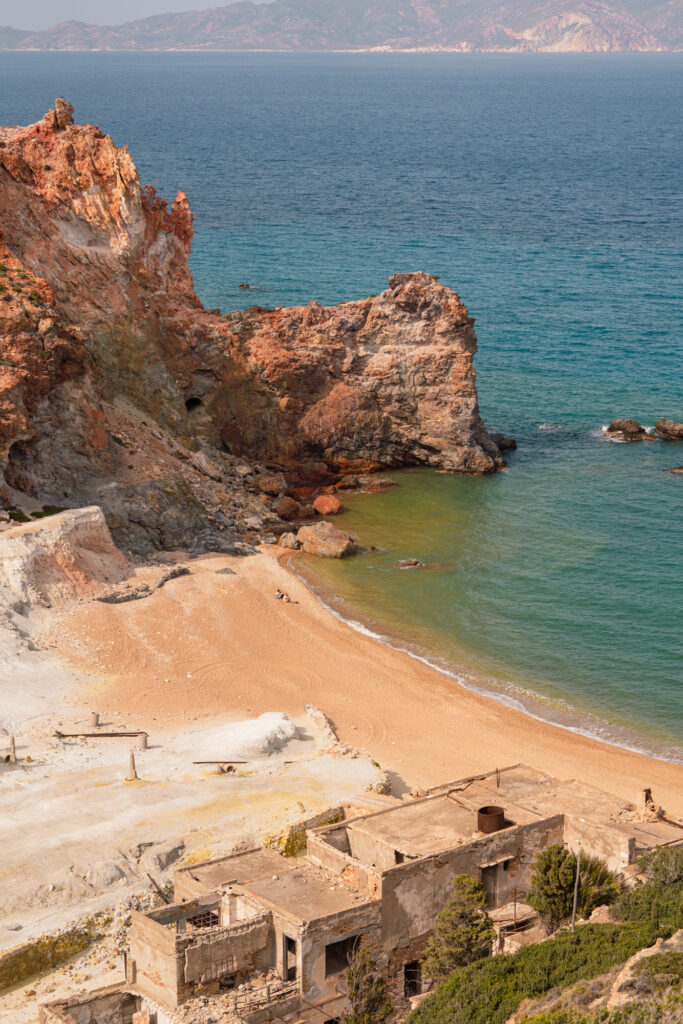
Wander through the open buildings and you’ll catch glimpses of old rusted machines and loading gear used to transport sulphur to ships waiting in the bay.
There are tunnels, pools, and the beach sweeps down to emerald waters flanked by cliffs with sparse vegetation and wildflowers. It’s an interesting local landmark, and even more so in the low season when you’ll have the place all to yourself. The drive down to the beach is tricky and requires a 4WD car or ATV. Or simply park nearer the main road and enjoy a scenic walk down.
Wine Tasting at Kostantakis Cave Winery
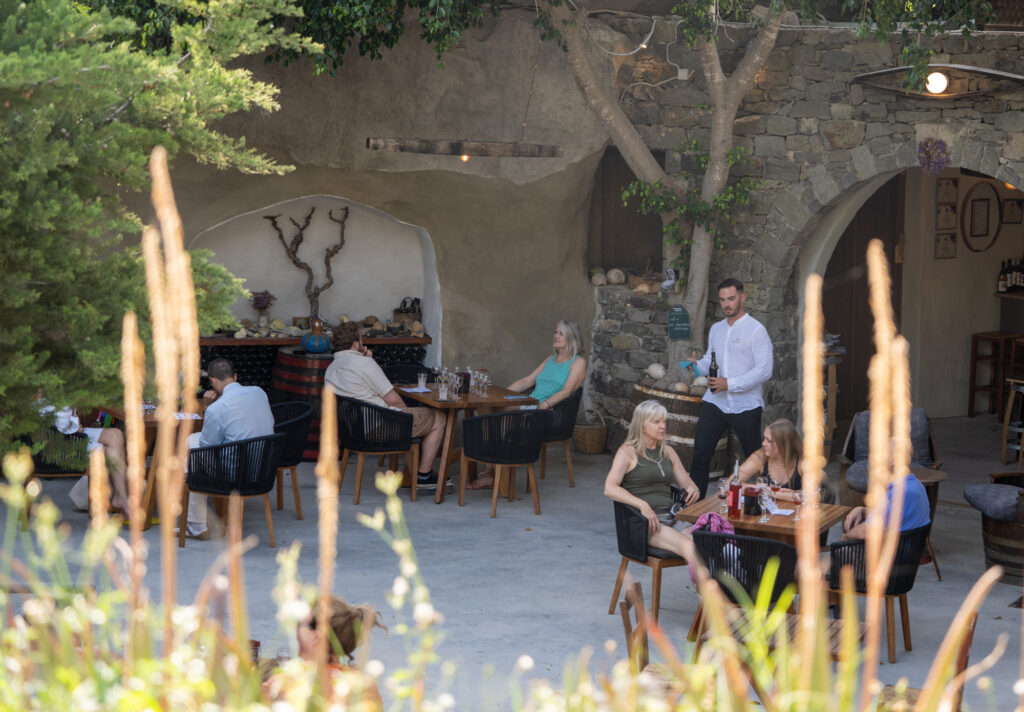
A tasting tour is a wonderful way to spend an afternoon or evening – it’s one of the favourite things to do on Milos for wine connoisseurs.
Kostantakis Cave Winery can be found at the base of a hill on a farm in Pollonia and it boasts one of the oldest vineyards in Milos. The first vines were planted by the grandfather of the family, and they are still producing grapes today.
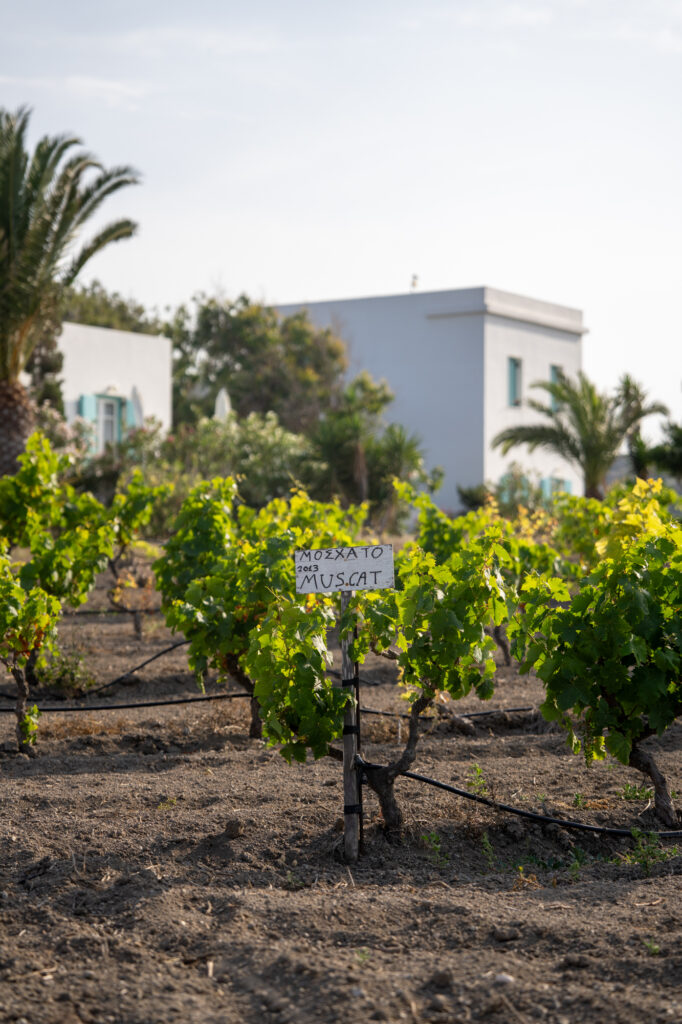
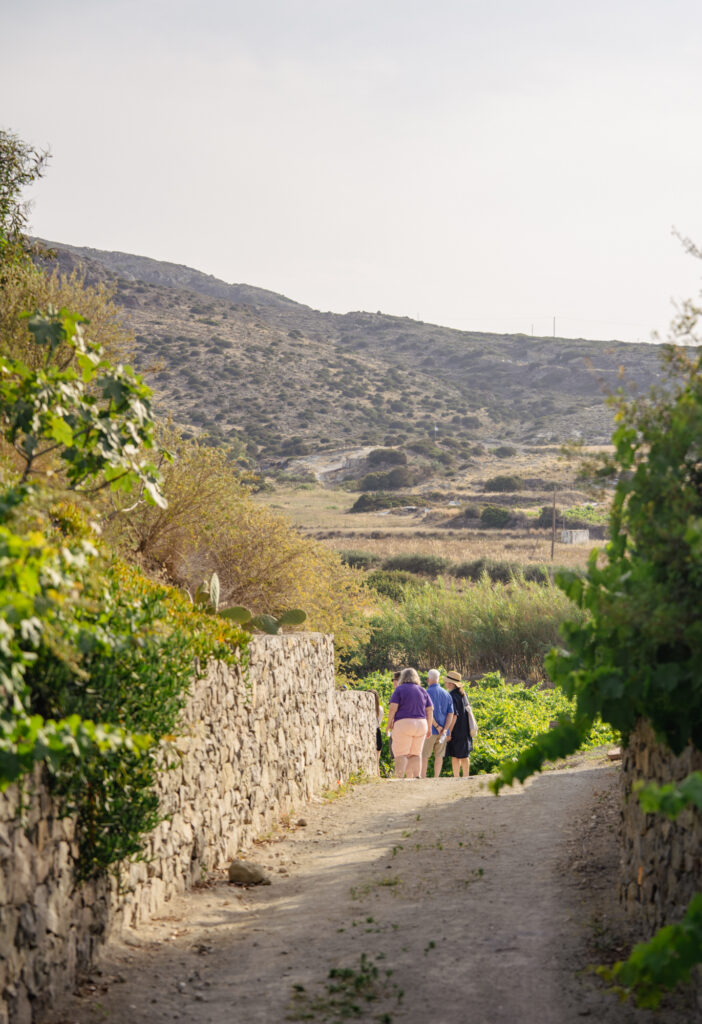
In 2012 the owners planted a new vineyard awash with Cycladic varieties of grapes including Malagouzia, Aidani, Mandilaria and Assyrtiko. Thanks to volcanic soils and a dry, warm climate these grapes produce unique flavours which can’t be found elsewhere.
Visitors can book a tour, see the vineyards and cave cellars, and then sit on the pretty patio sampling the different wines.
Family Day in Pollonia
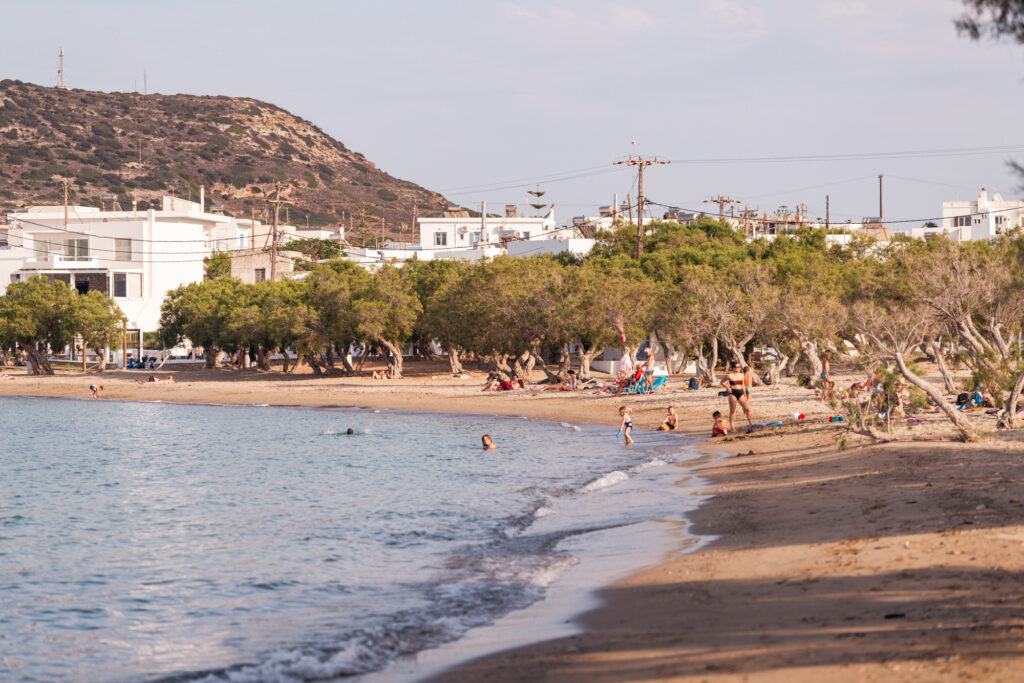
In the northeast corner of Milos is Pollonia, a family-friendly, charming village with a small promenade adorned with outdoor seating for local tavernas and cafés.
Creeping bougainvillea covers the facades of white-washed houses and along the bay, the tiny church of Saint Nicholas boasts spectacular views of Poseidon’s Throne.
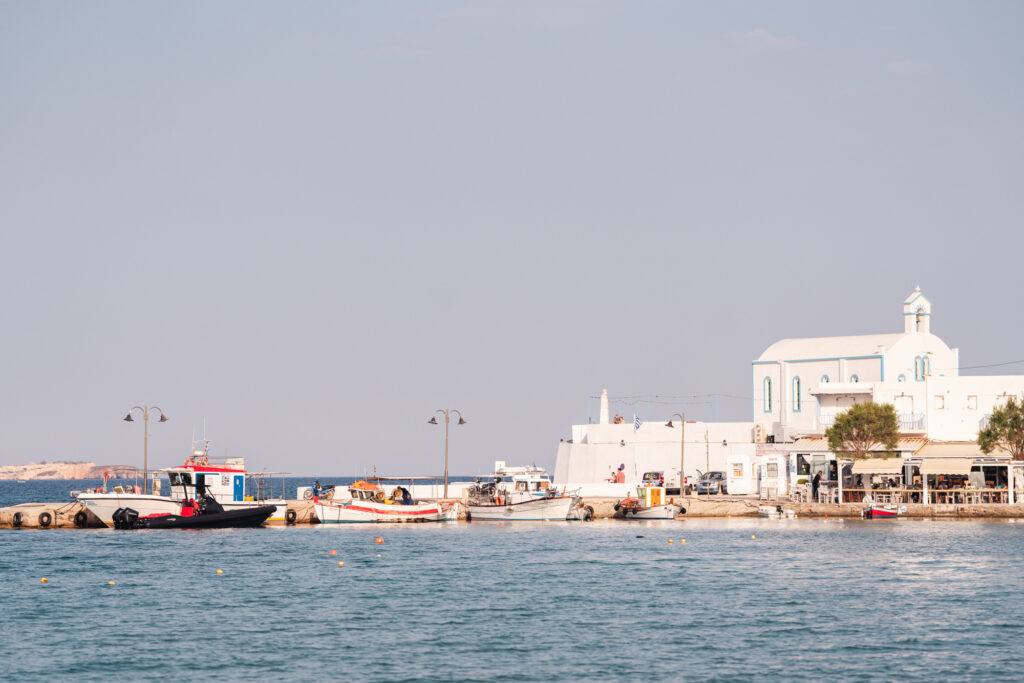
This natural geothermic formation is lapped by foaming waves and dotted with lichen. It resembles a huge armchair similar to depictions of one seating the ancient Greek God.
The bay around Pollonia is blessed with a beautiful beach and the crystal-clear waters are ideal for learning to dive.
Visit the Beautiful Fishing Villages of Milos
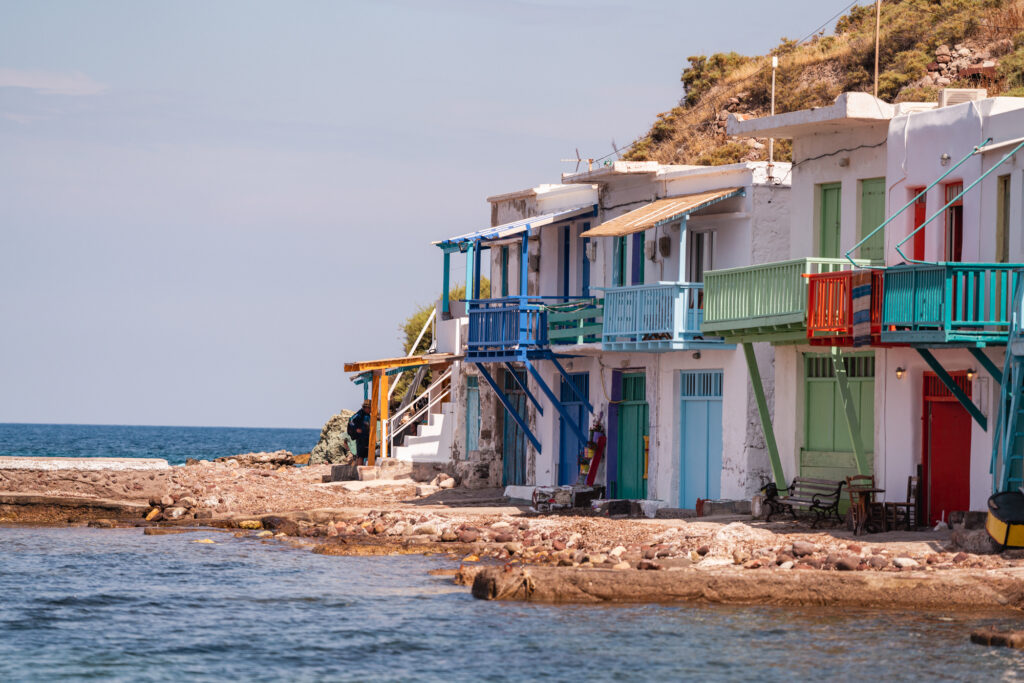
If you’re staying in Plaka or Trypiti, head for the colourful fishing village of Klima to see the ‘Syrmata’ boat houses. It’s believed that the first inhabitants arrived here around the 7th century B.C., and in the years that followed, Klima became a major trading hub.
The turquoise water is ideal for swimming, but the best time to visit is just before dusk. Take a seat outside a local taverna, feast on Greek cuisine and marvel at how the light catches the houses and sparkles on the water.
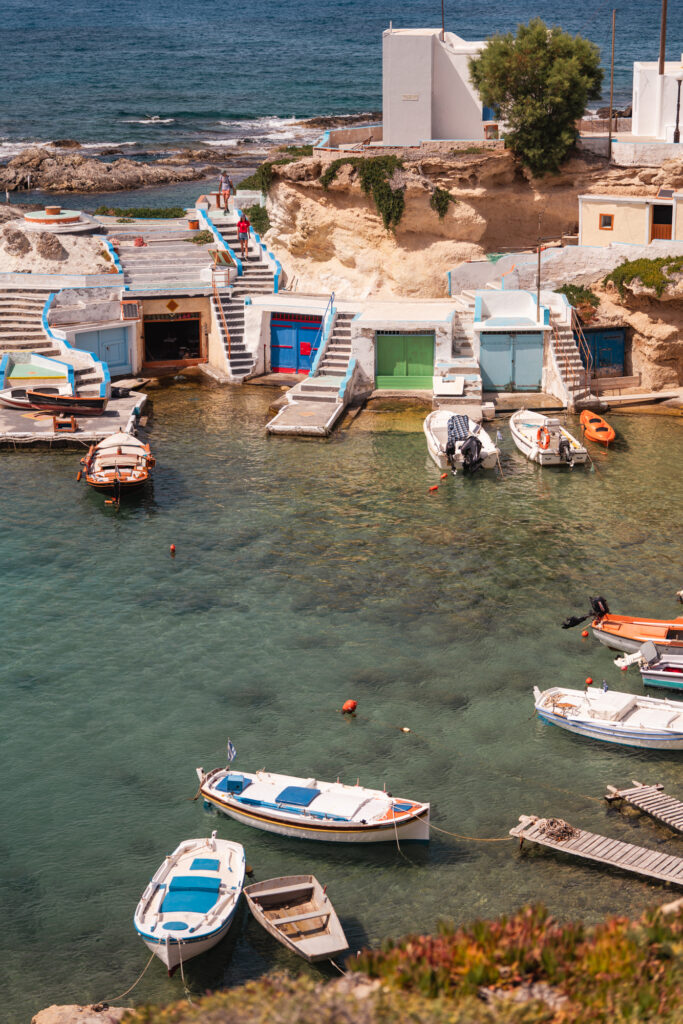
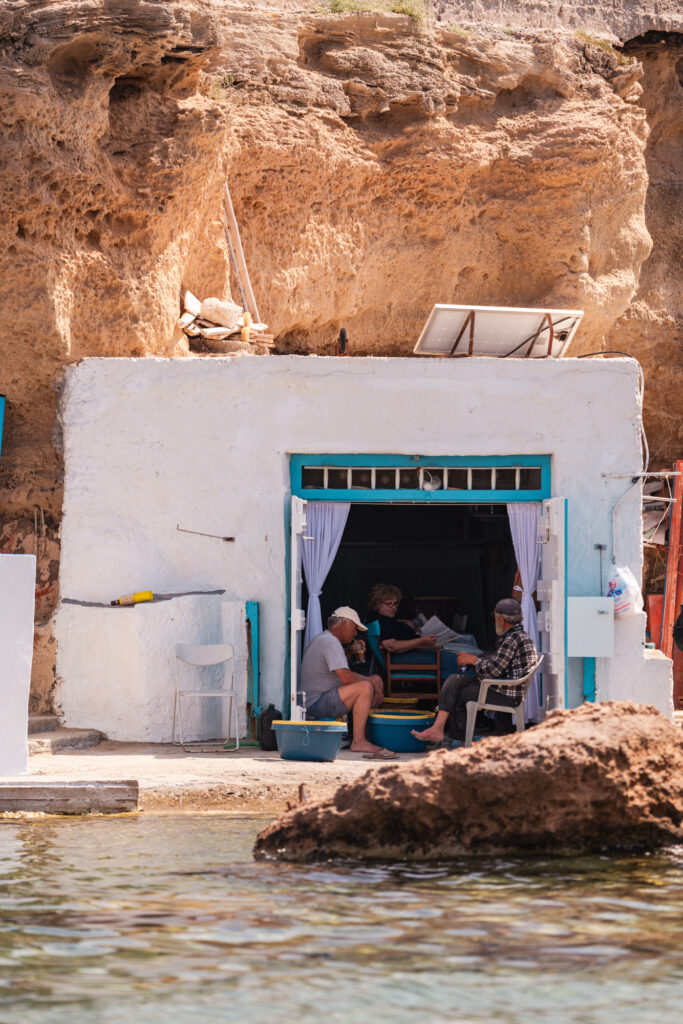
Another village near Plaka is Mandrakia, popular for its stunning architecture and houses carved into rocks around the tiny port. Walk to Zoodohos Pigi church for the best views.
For a more remote vibe, head to Emporios on the island’s western shores. A smattering of “Syrmata” houses pepper the port and there’s a small beach for sunbathing. Tourists can dine at a fish tavern or venture to the natural reserve of Rivari for a spot of birdwatching.
Getting to Milos
There is a small domestic airport in Milos that is served by four airlines; Olympic, Aegean, Sky Express and Cycladic. The first three run direct flights to Athens, whereas Cycladic offers routes between Milos and Crete or Syros.
Another common way to reach Milos is via the ferry. I recommend using the Ferryhopper website to search and book your ferries.
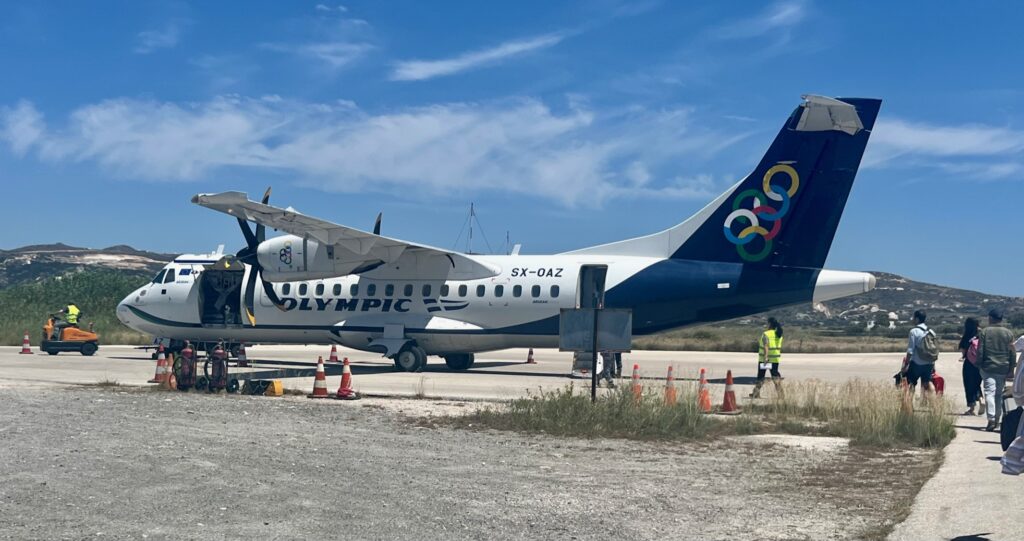
Getting Around Milos
While it is possible to see some of Milos with tours, or via public transport, by far the best way to get around is by having your own transport. However, this comes with a disclaimer.
Driving in Milos is challenging in some areas. The eastern side of the island generally has better roads and access, however, the western side is more difficult. When renting a car in Milos, you’ll see there are 2wd or 4wd drive vehicles available. If you wish to visit the western side of Milos, you’ll need to rent a 4WD. The sulfur mines at Thiorichio also require a 4WD.
That said, you’ll appreciate being able to visit the hidden beaches of Milos by having your own transport. Both rental cars and ATVs are available at the port town of Adamas, and the rental agencies will usually include delivery to your hotel, or the airport for free too.
Compare and choose your rental car here.
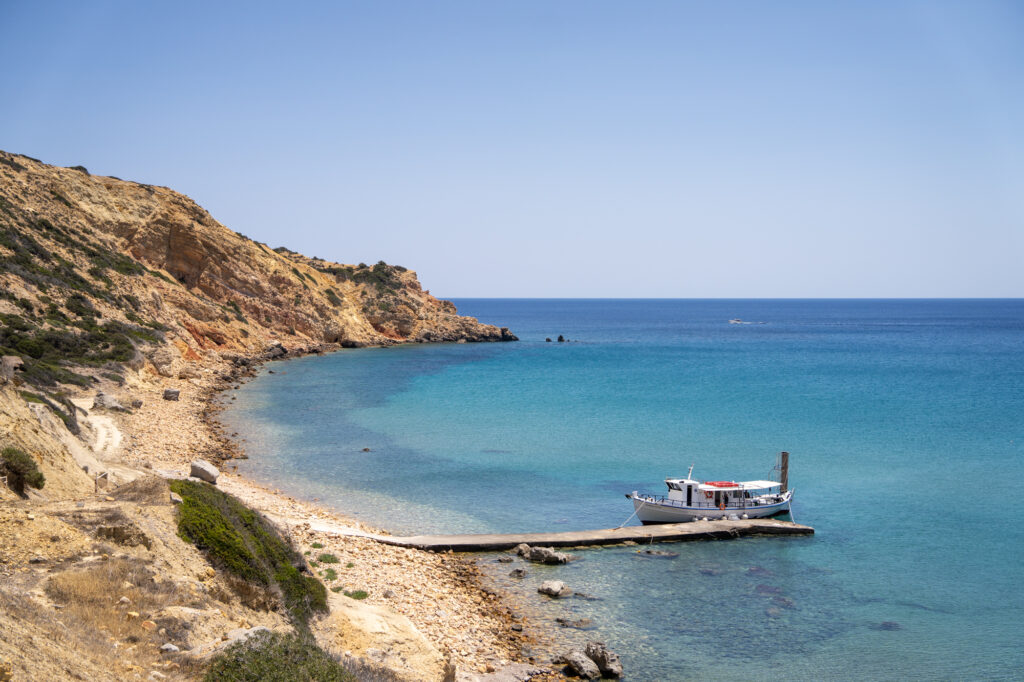
When to Visit Milos
Milos is becoming a hot spot in the Cyclades, and like its neighbours, the summer months are always going to be the busiest months to visit. But aside from the crowds, the Meltimi winds are at their peak in the high season (July and August) which makes beach days and sailing trips less fun.
Instead, aim for late Spring when the crowds are fewer and the island is fresh and vibrant, or early Autumn/Fall when the sea is at its warmest.
How Long to Spend in Milos
Milos is smaller than Naxos and Paros, so you can fit a lot into a short period. If you only plan on exploring the eastern side of the island, and perhaps do a boat tour for a day, then 3-4 days is ample. If you want to get off the beaten track and explore the untouched west Milos as well, add an extra day or two.
I hope this list of the top things to do in Milos Island Greece, gives you loads of inspiration on what to see and do during your stay. Although Milos offers a range of activities and attractions, what the island really does, is allow you to unplug and recalibrate amidst idyllic landscapes where nature is king.

